#Meta-analysis study
Explore tagged Tumblr posts
Text
Ok so. "Why does this sound like a goodbye?" Was fucking heartbreaking, right; we have the full-on uninterrupted eye contact, the head tilt, Dean's already open mouth twitching before the scene cuts to Cas' "I love you," like he had more to say, but Cas beats him to the punch. It's great, we love that. But for the dialogue to be sequenced that way, and to have Dean reply with, "don't do this, Cas."
I'm only just realizing how fucking insane it was. And sure, I might just be coping here, at the end of the day who fucking knows, but look at it. Think about it. Now let yourself feel it all over again.
It's Dean's death knocking on the door behind Cas, and it's Cas' death emerging behind Dean. Like this, they're directly facing their own demise—but they're too stuck on each other, in their moment, to give a damn. And then Dean doesn't say, "I love you too." He says, "don't do this."
He isn't disgusted or ashamed or put off in the slightest by Cas' confession, because if he is then why is he on the verge of tears? In what world would it make sense for him to want to cry after his best friend confessed to him, if the confession was something he did not want. He says don't do this here, don't do this to me now.
Even if, and that's the most unlikely if to ever exist, Dean did not reciprocate Cas' feelings—don't do this is still so fucking powerful. Because Dean's connected the dots, happiness [...] is in just saying it, and Cas said it, so where does that lead Dean? That's right, with Cas dead again, trying to save him again.
Don't do this. Don't die for me, don't love me only to die for me, don't love me at all, just stay with me.
Don't let me watch you die again and not even let me follow you—because, at the very least, that was a consolation. She's gonna kill you, which Dean knows that Billie knows will hurt him more than his own death, and then she's gonna kill me.
"Don't do this," was actually so fucking powerful, I don't know how it slipped past me until now...
#MORE destiel fuckery#supernatural#spn#destiel#castiel#dean winchester#deancas#15x18#spn 15x18#spn despair#dean studies#spn castiel#spn dean#spn meta#spn analysis#destiel angst
1K notes
·
View notes
Text
Female Guidance in Aventurine's Life
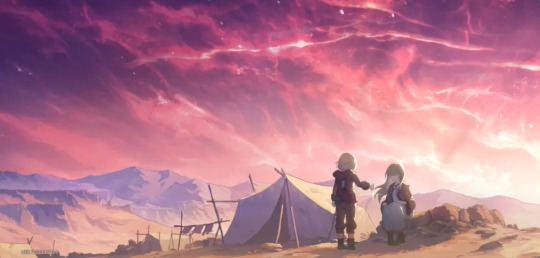
One thing I haven't seen discussed in much depth yet, but which I think is especially interesting, is the consistency of female guidance in Aventurine's life: Every single person who we have seen on screen offering Aventurine assistance or making a positive difference in his life is female (with one exception, yes, I'll get there).
Under the read more cause it's longggg:
Before even diving into his family, let's just get the obvious out of the way: Aventurine is, at least supposedly, blessed by a goddess. The very origin of his good fortune--be it actual blessing or curse--comes from the literal "mother goddess" who watches over him. This is one of the only instances in Star Rail where a god character is specifically given a gender, and Gaiathra is not ever ambiguous. She is the classic female fertility goddess with all the trappings of other famous triple goddess figures of the real world. Aventurine's personal belief in the goddess may be shaky, but he nevertheless continues to treasure his people's faith. Thus, at the core, we can say Aventurine is a character who is guarded by the most quintessential mother figure possible.
Now, with the most obvious out of the way:
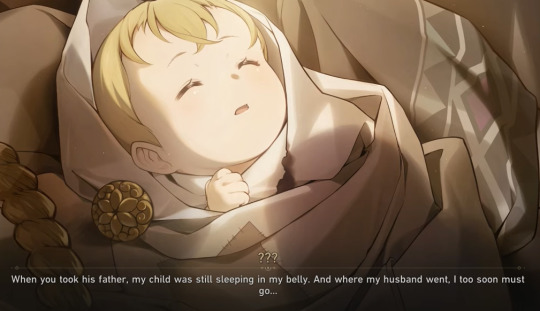
We know that Aventurine's father died before Aventurine was even born, and therefore he would not have any memories of his father, leaving him to be raised by his mother and sister.
Both women clearly made an enormous and lasting impression on Aventurine; they haunt every single one of his memories of Sigonia and are the key elements of the family Aventurine longs to return to. While he flirts with the concept of death as a way to see his family members again, it was also his mother and sister who instilled in him any sense of self-worth and meaning to his existence, the only things keeping him from giving up on living. His mother believed him to be blessed; his sister insisted to his face that not even the only remaining remnant of their mother had any value in comparison to his life.
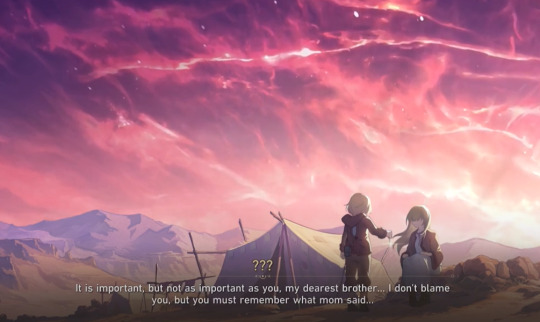
It is for his sister that Aventurine first begins expressing a self-sacrificial nature, and from his sister that this self-sacrifice is reinforced when she uses herself as a shield to help him escape massacre at the hands of the Katicans.
It is also from his sister that Aventurine learns many of the deeply meaningful actions he holds onto to the present day, despite having been so far removed from his own culture.
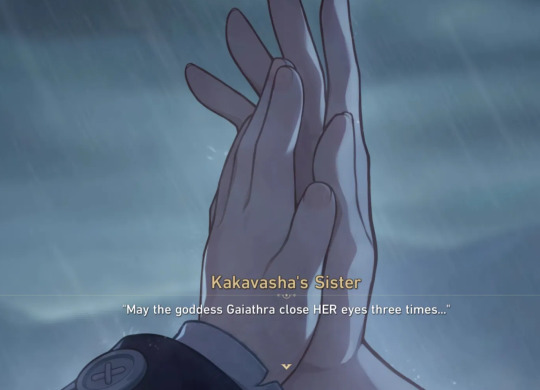
Conversely, every one of Aventurine's early negative experiences on screen appear to have been driven (at least primarily) by men.
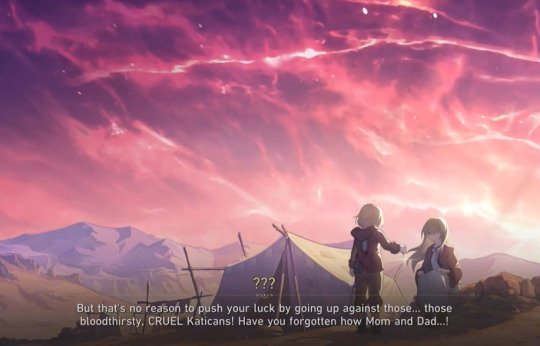
Although the Katican tribe of course would have both men and women, the tribal societies on Sigonia appear to be on the fairly traditional side, with Aventurine's mother staying at the camp with her child while his father was the one to go out and hunt for offerings for Gaiathra. This is also supported by Aventurine asking Jade to take him to her "chief" later on. Therefore, it is likely (although of course not guaranteed) that a majority of the Katicans' army was male, and that Aventurine's early experiences with outsiders consisted almost entirely of indiscriminate pillaging and massacre at the hands of what the Avgin viewed as savage, invading warriors. In separate instances, Aventurine was traumatized by these warrior figures three times--first with the loss of his father, then his mother, and then finally his sister.

And even their hope, supposed to come in the form of the "men in black" from the IPC, completely abandoned them, leaving Aventurine once again betrayed by masculine figures that were supposed to be there to protect him. Led by Oswaldo Schneider, another cruel male authority figure, the Marketing Department of the IPC permitted the wholesale slaughter of Aventurine's people--something which we know Aventurine is now aware of.
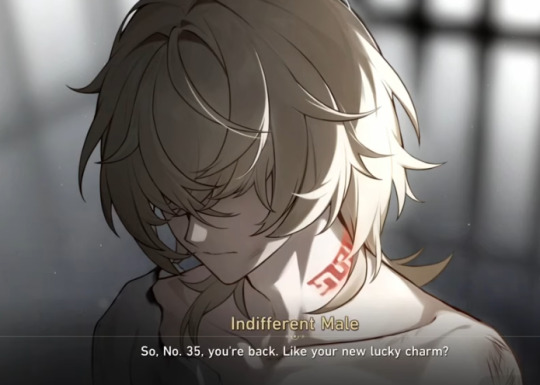
Then, of course, the next piece of Aventurine's backstory we're given is his male slave master. I don't really need to say anything about this, do I? This man violated Aventurine's human dignity and bodily autonomy, and forced Aventurine's hand in a life or death battle for which Aventurine still punishes himself mentally, even years in the future.
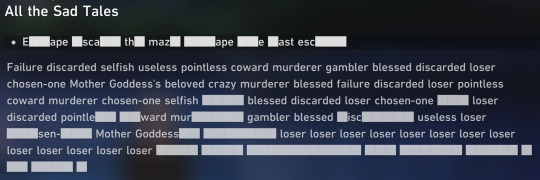
In part to escape the difficulty of his situation and rise to a position where he would have enough resources to--he thought--help his people, Aventurine joins up with the IPC. But when he attempts to make contact with a powerful man in the organization, Diamond, he is instead met by a woman, Jade, who against Aventurine's own expectations determines that she will raise Aventurine up (or use him as a tool, depending on how you currently choose to interpret Jade's motivations), granting him wealth and status beyond his imagination.
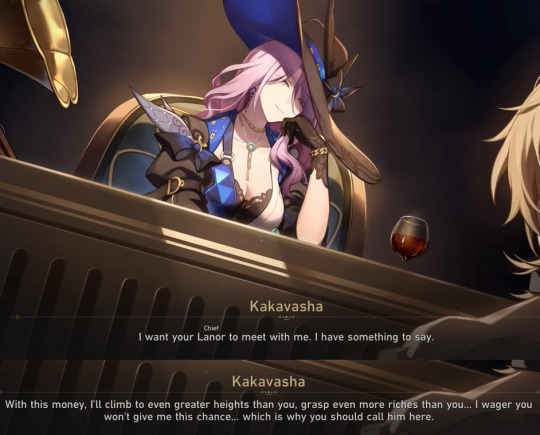
(And this line in particular is interesting, because you can take it one of two ways: 1) Aventurine comes from a patriarchal planet that traditionally put men into positions of power [thereby making his own slavery an emasculating act, aligning him further with disenfranchised women]; thus, he is making the assumption that to get anywhere in this organization, he will need to work with a man; or 2) He actually was counting on Jade taking his bet and helping him right from the beginning, because Aventurine perceives women as inherently more likely to protect and aid him than men would be.)
In the end, Jade does exactly as she claims she will, launching Aventurine into a position of power while also closing golden handcuffs around his wrists. She positions herself not only as his supervisor, but as his advocate and ally. She entrusts him with her Cornerstone, a sign of significant faith in his abilities. She even seems to be keenly aware of his bias towards the mother figure, referring to him as "child" in their conversations.

Whether this is genuine or a manipulation tactic can certainly be debated (and I'm not inclined to think at this point that Jade is a genuinely good role model or selflessly supportive person in Aventurine's life), but whatever the case, women are the only people Aventurine even remotely considers to be "in his corner."
We see this even earlier, in Aventurine's call to Topaz. Like with the example of his mother and sister, Aventurine trusts in Topaz's ability implicitly, and considers her above anyone else when it comes to completing the mission in Penacony.
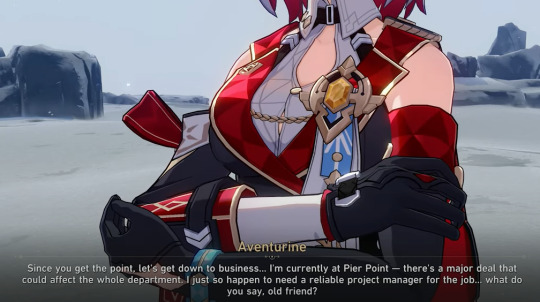
Although of course we don't know if Aventurine has any other friends or allies among the Strategic Investment Department, it seems very likely that Topaz, yet another woman, is the one he is closest with. At the very least, she is the only IPC character (so far) that Aventurine has a complimentary voice line for, one that shows his respect for her talent:

Over and over again, the story aligns Aventurine with female figures in positions of authority, and demonstrates that he is comfortable (although maybe not too comfortable, in the case of Jade) with relying on them and trusting their judgment, just as he did with his mother and sister.
And this pretty much goes off the charts in Penacony, where Aventurine has more involvement with the female cast than virtually any other non-female character (even the Trailblazer!). We set the pattern off right away, with Aventurine immediately being placed into a negotiation situation with Himeko, respecting her role as the Express's leader and working to get himself aligned with the Express by acquiescing to her request for support.
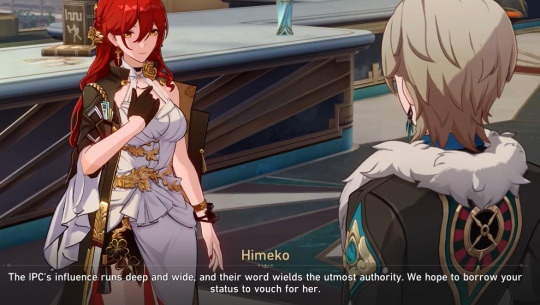
Then there's the fact that Aventurine is the one who finds Robin's body, an event which, although he didn't let it show too much, was almost certainly traumatic for him, given the violent death of his own sister.
Next, twice in Penacony's story, we see Aventurine seek out Sparkle for information. He may not personally like her and her comments may be both racist and dehumanizing, but Aventurine does rely on her--being the only character explicitly seeking her aid, which no one else in Penacony seems to want.
In 2.0...

And in 2.1.
Now, say it with me, guys: Aventurine built an entire portion of his grand plan around the idea that if he looked pathetic enough, a female character would absolutely come and help him. And sure enough, the women come through for him, always! Sparkle gives him the exact last clue he needs to confirm his belief that he could use "Death" to reach the true Penacony, sealing the deal for the rest of his plan.
His plan which also hinged significantly on Black Swan's involvement too, another woman that he views as, if not trustworthy, then at least intelligent and hyper-competent.
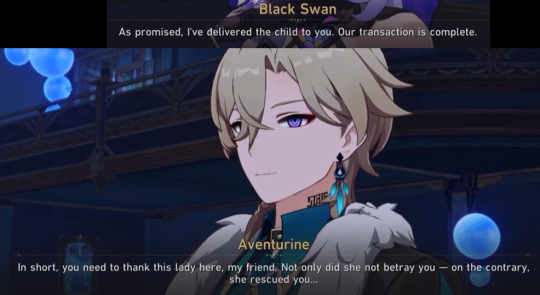
Contrast all this, of course, with the treatment Aventurine receives at the hands of Sunday, the lone opposing male character he faces in Penacony.
Sparkle implies that Sunday would humiliate Aventurine in an unmistakably sexual and degrading way, and Sunday himself professes this same desire to see Aventurine humiliated.
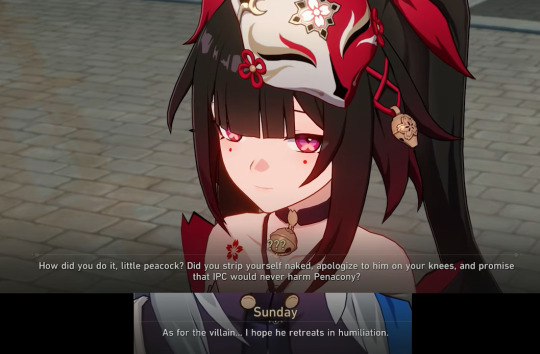
Then we're "treated" to the moment in which Sunday uses the Harmony's (or perhaps actually the Order's?) power against Aventurine, in a scene which is supposed to reflect an interrogation but is also, very clearly, another nonconsensual violation of Aventurine's bodily autonomy and dignity by a man. While ostensibly seeking confirmation of the Cornerstone ruse, Sunday instead subjects Aventurine to unnecessary questions about his past on Sigonia, which recall and force Aventurine to re-endure memories of his trauma.
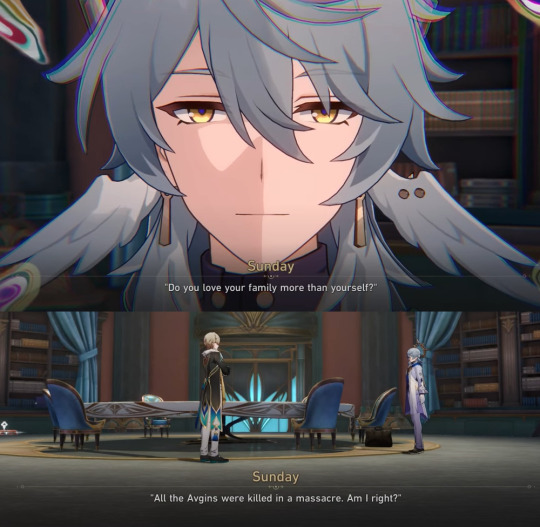
Even if this is what Aventurine prepared himself for and planned to have happen, the pain he experiences is very real, and he suffers both the physical and emotional consequences of Sunday's assault all the way up to his "Death" and possibly even beyond.
(Also, Sunday fans please don't get too up in arms with me for this; I also like Sunday! It's okay for characters to be morally grey!)
I think there's one other interesting example I would bring up here too, and that's Aventurine's conscious decision to weaponize his own masculinity against the Trailblazer. Through the 2.0 and 2.1 Trailblaze missions, Aventurine deliberately acts in an off-putting manner to the Astral Express crew, particularly the Trailblazer, in order to build up to the 2.1 climax where the Trailblazer is supposed to view him as an unrepentant villain and attack him without hesitation.
In order to achieve this uncomfortable, villainous effect, what does Aventurine do? Exactly what other men have done to him.
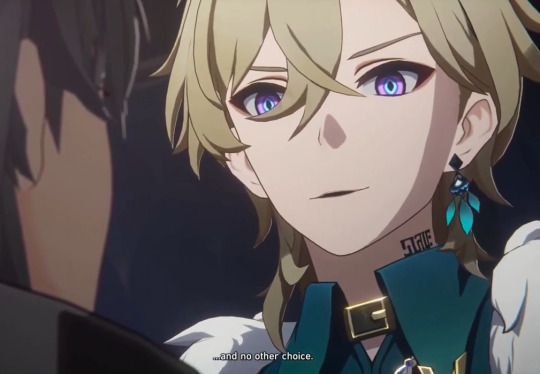
This is especially apparent if you're playing Stelle because of the ingrained societal taboo of a man entering a woman's personal space without consent, but even as Caelus, it is very clear that Aventurine is leveraging behaviors typically used to show dominance: In a complete 180 to all Aventurine's other body language in the game (normally quite withdrawn, frequently in defensive postures with his arms crossed or hand behind his back, almost always standing several feet away from other people), Aventurine violates the Trailblazer's personal bubble, looming over them (Caelus was sitting in this cutscene, lol), forcing eye contact, and commanding the space while informing them that they will have no choice.
For someone who was hunted, enslaved, had his movements restricted with chains, and due to his own slight stature has very likely been towered over by others who were intentionally asserting their power over him all his life, it is clear that Aventurine associates dominant, typically more masculine-coded physically-imposing behaviors with discomfort and even villainy.
Any girl who has ever had a man loom over her like this will realize very quickly: Aventurine wanted to make himself scary so he made himself act more like a bad man.
(Yes of course I know "not all men." I'm not saying every man behaves in this domineering way or that women cannot be domineering too, obviously, just that Aventurine had a very specific image in mind when constructing a "villainous persona," and the physically controlling tactics most typically used by aggressive men toward women was his immediate go-to.)
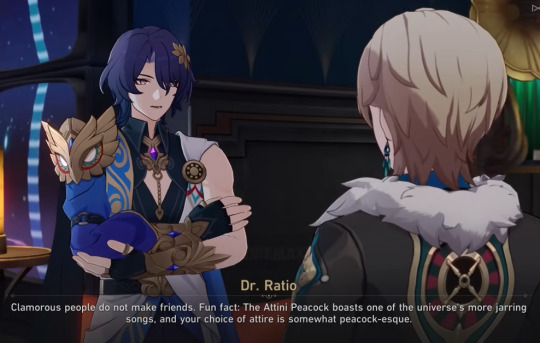
But where does that leave Dr. Ratio, the one male character actually on Aventurine's side?
Frankly, I don't want to derail my post about how intensely Hoyo chose to hammer on the message of "Women will protect you" in Aventurine's story with a discussion about a mlm ship, but the take-away here is going to lead in that direction anyway--so yes, Dr. Ratio is the exception.
What is interesting is that he does not come across as an exception at first, and in fact initially appears as another male character being rude and dismissive to Aventurine. Like, there are still people out there calling Ratio an unrepentant racist for this one.
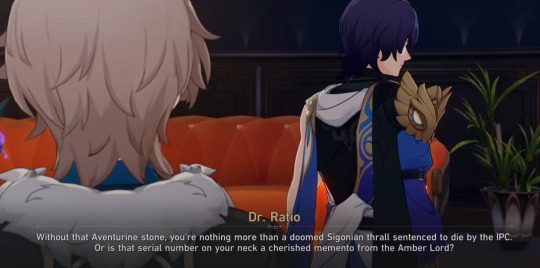
Of course, it's later clarified that this is an act--likely even these insults were scripted specifically to give Sunday's spying ears the "insight" he needed to exploit Aventurine during the interrogation.
But even though it is an act, Aventurine still has noticeable trouble putting his faith in Ratio. He does genuinely doubt him a few times, despite knowing that they are working together to fool the Family.
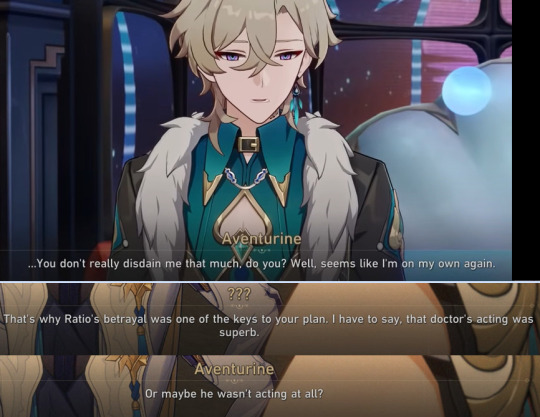
Even his voice line about Ratio confirms that he doesn't think Ratio particularly cares for him; rather, he thinks Ratio simply tolerates him because he's slightly less unintelligent than those around them.
Ultimately, the entire act with Ratio ends up being a mirror of the real scenarios Aventurine has been experiencing with men his whole life (at least as far as we are shown his life). Men abandon him to fend for himself (unwillingly, like his father, or willingly, like Diamond leaving Aventurine to deal with Penacony alone on the inside). Ratio keeps leaving Aventurine completely alone. Men attempt to humiliate him and violate his boundaries (like Sunday and his slave master). Ratio insults Aventurine's appearance and intelligence repeatedly. Men betray him (like Oswaldo Schneider and his men leaving the Avgin to die). Ratio "betrays" him.
I'm not saying when Aventurine devised the plan for their act, he consciously drew up a list of all the ways men had hurt him in the past and had Ratio re-enact them one by one, but like... that's what happened, whether or not Aventurine intended it.
And okay, the shrinking scene in Dewlight Pavilion was just for fun and probably only slightly fetishy, the devs promise; yes, it was supposed to be a joke! ...But it's also not a mistake that this is yet another instance of a male character in a glaringly metaphorical position of power over Aventurine. Aventurine's tiny in this scene! He's completely vulnerable! He's in a dangerous position and the male character could very much hurt him in this moment.

But Ratio doesn't. (In fact, his line here is supposed to be sarcastic, very ha ha--but also, what is Ratio really saying? "I won't do anything to you without your express consent." What a good guy.)
Virtually everything negative that we see in 2.1 is Ratio doing these things as an act at Aventurine's own request. He doesn't actually disdain Aventurine; his own voiceline about Aventurine reinforces that he sees Aventurine as talented and intelligent.
Whatever you think he was apologizing for in their early scene, he's the only person we're ever shown in-game apologizing to Aventurine at all.
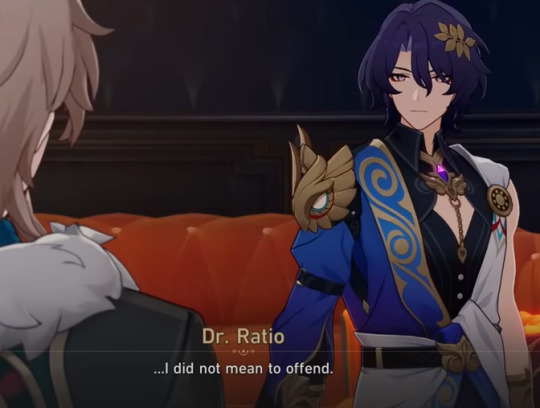
He worked hard to "betray" Aventurine but only as he was instructed to do, and immediately checks in on Aventurine's well-being afterward, even urging him to give up the plan if it becomes too much to handle.
And then, of course, there's the note: "Do stay alive. I wish you the best of luck."
After this point, it cannot be denied that Ratio is unequivocally on Aventurine's side, wants to help him, and is not doing so out of any sense of self-gain but largely because he is a good person who simply cares about Aventurine's fate. By the end of 2.1, it can no longer be doubted that Ratio is the exception to the "gender rule" of Aventurine's life, which--the story shows us again and again--was that guidance, protection, and care for Aventurine come from women, while men repeatedly represent dismissal, betrayal, or pain.
Ratio is, at least as far as Aventurine's story shows us, the proof that men can be good, that things are not as black and white in Aventurine's life as they might appear, and that--if you do choose to ship him with or see Aventurine as attracted to men--his attraction could be validated (and potentially reciprocated) by a male figure who would not bring additional harm to Aventurine's life. Aventurine makes the final decision to live after seeing Ratio's note--the exception to the rule ultimately proves to be the last piece needed to keep him alive.
But I promised I wasn't going to derail my own post about w o m e n, so let me get to the final point, and the one I really wanted to talk about: Although Ratio gets virtually all the credit for "saving" Aventurine in the fandom, Aventurine was actually saved by, you guessed it, another woman.
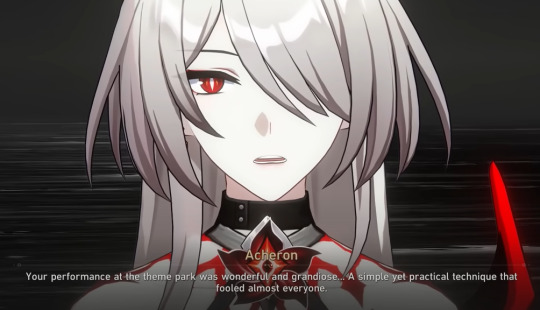
Not going to lie, the reason I started this post was specifically because I wanted to talk about how Acheron and Aventurine's dynamic was completely unexpected but actually fits flawlessly with the theme of feminine guidance in Aventurine's story.
Despite the fact that Aventurine made Acheron's life much harder and actively used her as a chip in his grand gamble, she doesn't blame or chastise him for those actions. Although she expresses some incredulity that Aventurine is actually that lucky, she then turns around and congratulations him for his ingenuity, immediately supporting him despite the fact that they don't even truly know each other.
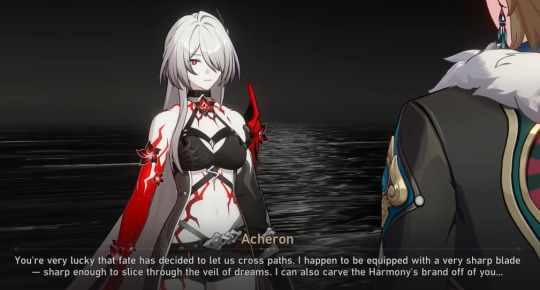
Then it gets even more interesting. Acheron, who frequently hits her companions with deep and sometimes very emotionally fraught questions, asks Aventurine: "Have you never wavered?"
We as players know for a fact that Aventurine is constantly wavering, constantly doubting himself, his luck, and whether he'll even live--or even wants to live--to see tomorrow. But we also know that Aventurine is not forthcoming about those truths, refusing to express them to anyone, even himself. The only way we hear those dark truths is through his "future" self (who by the way, is once again another male figure cutting Aventurine down--of course it's himself but it's also, from the player's perspective, once again reinforcing the message that he isn't going to find safety or kindness in an adult male presence). Aventurine almost constantly deflects and diverts when his emotions or struggles are brought to the fore (unless he's divulging them for the specific purpose of allowing someone else to weaponize them). "I'm fine," he says, like a lying liar who lies.
But he doesn't lie to Acheron.

He chooses to be completely candid with her, to lance open the deepest wound of his life--that he can win and win and win and still have lost everything. The glitz and the glamour has all been stripped away here, at the end of everything, and Aventurine finally feels safe enough to admit that he fears he has absolutely nothing in his life worth living for.
And then, we get this direct parallel: Aventurine looks to Acheron, the woman now before him, for guidance, for explanation, exactly as he looked to his sister in the past.
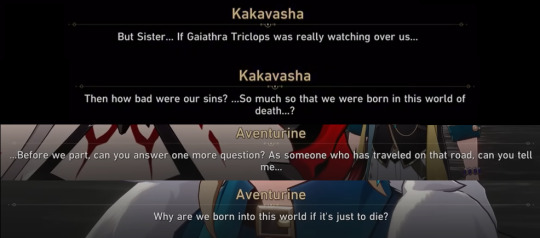
He needs help, he needs answers, and he is continually seeking that help from the female figures in his life, whose support and kindness echo the lost care of his mother and sister.
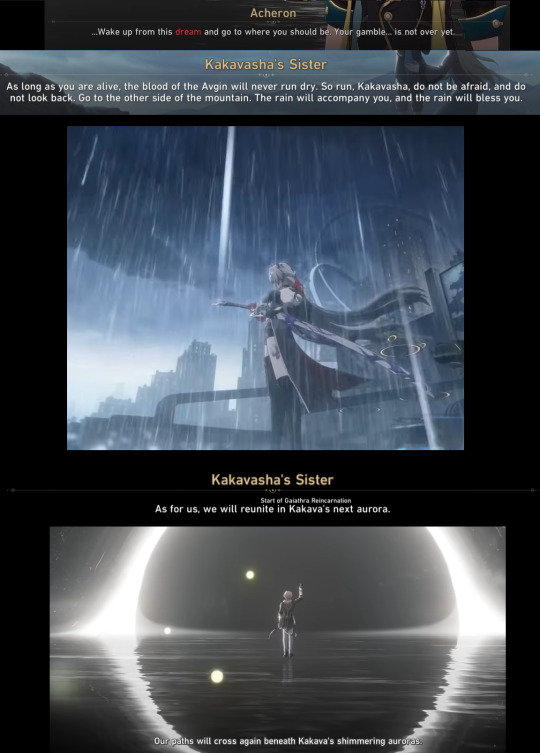
"Go where you should be," Acheron tells Aventurine, guiding him across the river of death just as his sister insisted that he flee through the rain toward life.
Look guys, Acheron's even the one who reminds Aventurine to look at Ratio's note in the first place because apparently being an emanator of Nihility gives you x-ray vision, but my girl just gets no credit at all for being Aventurine's real savior, come on now!! Yes, Ratio's note was the final reminder Aventurine needed that someone would be waiting for him on the other side, but Aventurine would never have even gotten to the point of being willing to read that note if Acheron hadn't stepped in and provided him an answer to his question.
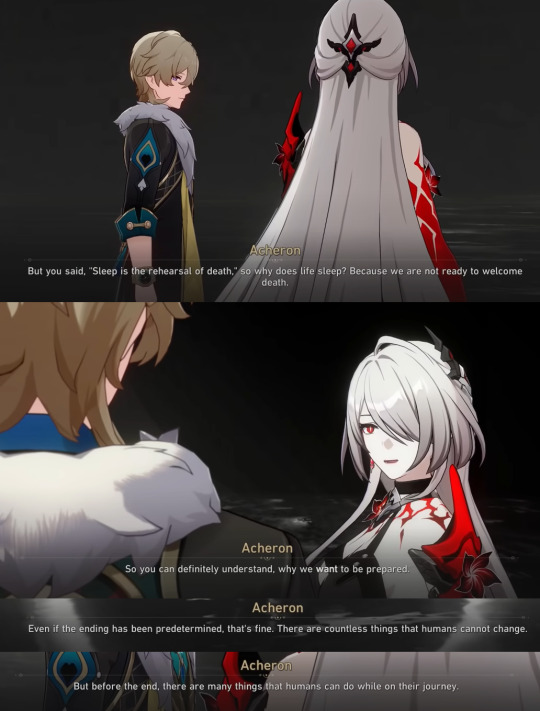
She feeds him back his own answer: "Why does life slumber? To rehearse the death for which we are not currently prepared." It is Acheron who reminds Aventurine that giving into the Nihility is pointless, and that rather than simply embracing a meaningless death, it is up to humanity itself to find and make meaning by living. It's this, not Ratio's note, that Aventurine gives as his reason for choosing to go on when asked by his own younger self. It's Acheron's words that finally give Aventurine an answer--why do we live just to die? Because there are people we can still make proud. Because when we go into death, we should do so with our heads held high, having achieved our own sense of purpose in this life.
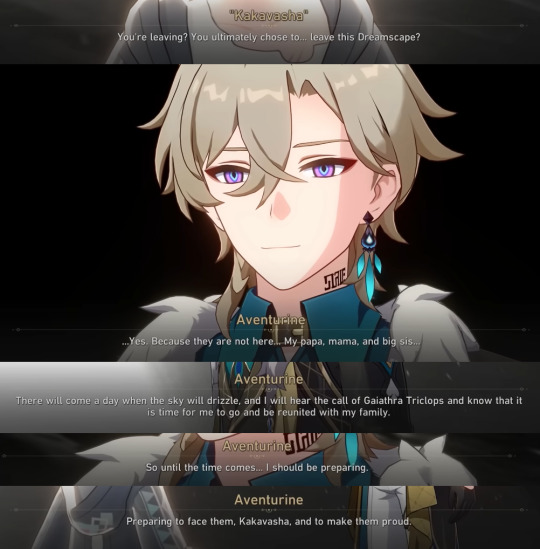
Ratio gave Aventurine a promise: Someone is waiting for you to come back.
But Acheron gave Aventurine a reason: If life is inherently meaningless, doesn't that just mean you are free to give it meaning yourself?
She saved him, as women have been saving him all his life.
Anyway, this has already been horrendously long, but really what I wanted to say is that I think it is absolutely fascinating how consistent Aventurine's writing is when it comes to portraying where his support comes from and who he seeks guidance from. (Psst, just in case you still haven't figured it out, it's women!) In virtually every instance we are shown, we see the message reinforced that women are Aventurine's greatest allies and role models, while male figures are continually positioned to intentionally or unintentionally let him down and cause him distress.
"But women playing the supporting role to a male character is nothing new, Star, why are you so excited by this?"
Because the role women are playing in Aventurine's life is not the subservient supporter and emotional crutch role that female characters all too often play to male counterparts. None of the women in Penacony or Aventurine's past were there to do the emotional labor for him, to be a trophy or prize, or to cater to his needs. They don't exist solely to help him fulfill his character motivations; they aren't following him around waiting for his next request as their only role in the plot.
Instead, with Aventurine's story, we almost have an inversion of gender roles, where the male character eschews the stereotypical "men are leaders, fighters, and stoic heroes" archetype. Instead, no matter how hard he tries to hide it and keep a stiff upper lip, it is clear from 2.0-2.1's story that Aventurine is a deeply insecure, lonely, and explicitly traumatized survivor of genocide, slavery, and exploitation. Unlike most male characters, who are very rarely portrayed as genuine victims--because come on, shouldn't men be strong enough to fight back? Shouldn't men be able to shrug it off when they are hurt, emotionally or physically? (Of course I'm rolling my eyes here!)--Aventurine is belittled, humiliated, emasculated, and victimized on-screen, roles almost exclusively reserved for women, for whom surviving victimization in fiction is seen as noble.
Meanwhile, the women in Aventurine's life take on the roles traditionally given to male characters. They're both emotionally and physically his protectors. Aventurine's sister gave her life to guard his safety; Acheron ensured he could safely pass beyond the river of Nihility into the Primordial Dreamscape. They give him the tools necessary to succeed where he could not succeed on his own. His plan could never have gotten off the ground without Topaz and Jade entrusting their Cornerstones to him. The knowledge and capabilities of the women around him--not their "feminine charms"--are what allow them to help keep Aventurine on the right path even though he does waver. Even women who disrespect him, like Sparkle, still play a positive role in his life, able to provide him insight gained with their own intellect and talents.
When he has no one to rely on and doesn't know what to do, Aventurine is able to continually turn to the women around him, asking for and receiving not servitude or fawning, but their genuine wisdom and guidance.
tl;dr: If nobody else has him, Aventurine knows this random woman he met two minutes ago on the street will have him, because the women in his life literally never let him down.
(It's just so, so good, and ultimately, it should be very clear why Aventurine's story is as popular with women as it is! A+, Hoyo!)
#honkai star rail#aventurine#acheron#topaz hsr#honkai star rail meta#character analysis#there's a bit of#ratiorine#in here too#but mostly I ramble about WOMEN#thematic parallels#thematic parallels everywhere#it's long#I'm sorry but not really#sometimes you act like a normal fan#other times you're me#and write essays that wouldn't be out of place in gender studies class#also I hit the '30 images per post' limit and had to make do#please ignore the terrible merging I did of the photos#don't perceive my MS Paint job
950 notes
·
View notes
Text
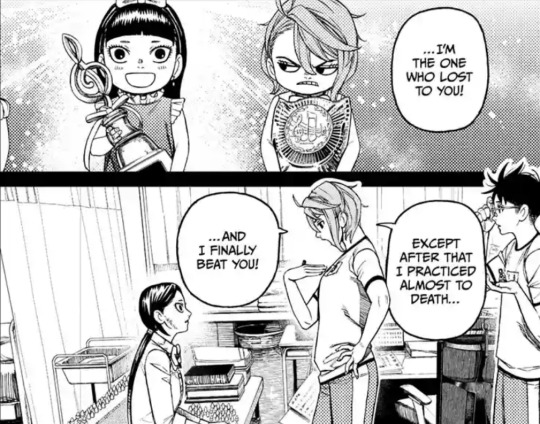
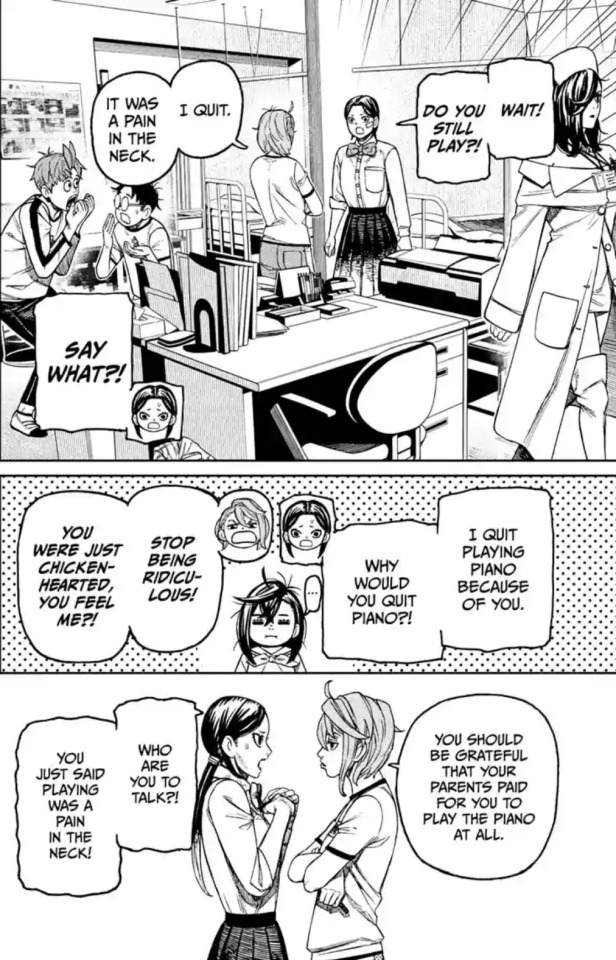
This interaction explains a LOT about Aira's character, and why her feelings for Okarun feel so unserious when compared to the likes of Jiji. Aira didn't enjoy playing piano, but she cannot STAND losing to someone else, leading to her obsessively working to win. But after winning, she lost interest in piano altogether because she 'won,' and no longer had the drive to play.
For a long time now, Aira's place in the story feels way more like she is invested in Momo. Momo is the one who inspires character growth in Aira on at least two different occasions I remember (confessing to spreading rumors after the fight with Nessie, and becoming more serious about fighting when she accidentally caused the Evil Eye to attack Momo), but while Jiji is slowly moving into a position where his feelings for Momo can no longer be ignored by the other characters, Aira's interest in Okarun is basically a hamster wheel. It spins and spins, but it doesn't go anywhere. But Aira clings to it out of stubbornness because she doesn't want to admit defeat, while at the same time never making serious effort to get Okarun to see her as a viable romantic partner.
From the start, the majority of Aira's focus has been on Momo. First by convincing herself Momo was a demon that needed to be defeated. Then trying to insist that she needed to save Okarun from Momo. And now she has fallen into a comfortable pattern of throwing herself at Okarun any time Momo is around to incite Momo into arguing with her. But she ONLY does that when Momo is around, and then loses interest in Okarun the moment she and Momo start throwing hands. I suspect that's the real reason she isn't doing anything to either try and seriously progress her relationship with Okarun or bowing out the way Rin and Vamola did once they realized that they were better as friends rather than trying to get between Momo and Okarun. Because she is afraid that if she doesn't push the idea of liking Okarun or makes a serious effort and either 'wins' or gets turned down and can't justify pushing herself on him any longer, she'll lose the frienemy relationship she developed with Momo.
And in the end, what keeps Aira going is the competition, not the trophy she earns when she wins.
#dandadan#dandadan spoilers#manga spoilers#aira shiratori#momo ayase#okarun#ken takakura#kouki yukishiro#momokarun#meta#relationship analysis#character analysis#normally aira's character type is a miss for me#but it's fascinating to study her and see the reasons she does what she does#and how much momo means to her even (even though she will swallow flaming swords before admitting that out loud)
197 notes
·
View notes
Text
Every time I see a story, be it canon or fanfic, where Jason is like "wow my morals are kind of fucked up I should never kill again" I have to put it down, close the tab, ect. Because HE WOULD NOT FUCKING DO THAT. We're talking about Bruce's number one fan turned antagonist.
Do you not think he's maybe already considered such a thing?
The thing about Jason is that he's as devoted to his views and sense of justice as Bruce is, maybe with a little more flexibility (i.e. he's willing to temporarily stop killing if it's necessary for his overall goals where Bruce wouldn't be able to kill even if it would benefit everyone in the long run) and any run or story where he completely disregards his own moral compass and personal experience to follow Bruce's rules is just a disservice to his character.
His whole thing is that Batman's methods are ineffective and his unwillingness to either do what needs to be done or let someone else do so is a clear sign that he's not the hero Gotham needs. Jason genuinely believes everything he says about the system, and Bruce's ineffectiveness.
His crime lord era wasn't just a silly little thing he did to fuck with Bruce with the final confrontation as the REAL point of Under the Red Hood, he became a crime lord because he believed it was the best way he could help. The point of Red Hood is protecting Gotham, fucking with Bruce was just a bonus. Like the confrontation wasn't even initially planned, Jason haphazardly threw that at the end of his to-do list after he realized he couldn't just blow up the Batmobile.
Stop reducing Jason's motivations to "get Bruce's attention/make Bruce kill".
#dc#jason todd#bruce wayne#meta analysis#character study#fanon (derogatory)#this doesn't go for stories where he ditches his revenge quest because he realizes what he's actually been looking for is proof he's loved#however that's a whole other post#if you know me you already know my opinion on non dysfunctional batfam#which is to say I don't agree I want them to tear each other apart and I want Jason to dip as soon as possible
630 notes
·
View notes
Text
Apart from the fact that Padmé had said she knew she’d no longer be allowed to serve in the senate, Anakin saying he wanted to leave the Jedi and be with Padmé, and Padmé outwardly saying that she wanted to raise her and Anakin’s kids on Naboo, and run away with him to the Lake Country (it’s even stated so by Trisha Bigger in Dressing a Galaxy, when asked about what Padmé’s funeral dress was supposed to symbolize):
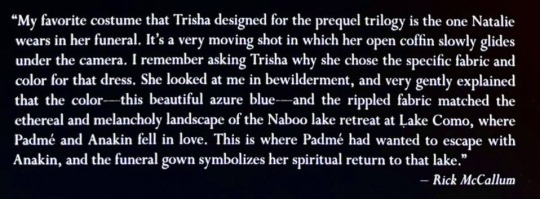
We do see a bit more implications within the ROTS novel that tell us how Padmé and Anakin were keen on leaving behind duty, to live together peacefully, and raise their kids.
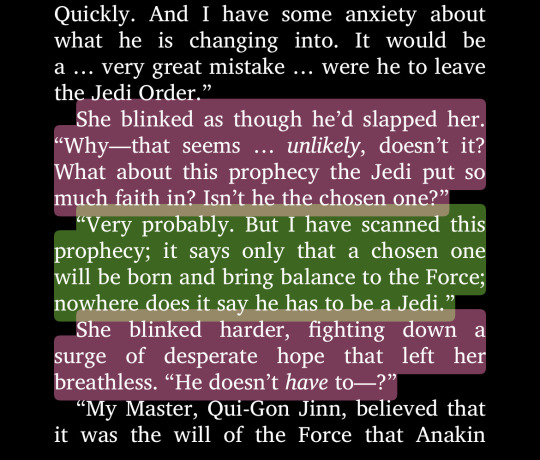
In this scene of the novel, we see that OW is encouraging Padmé to watch over Anakin (as he’s growing more concerned of his mental state) and somewhat asks her to “leave him” because her relationship to him strains his position as a Jedi, and it would be a mistake if he left. Padmé insists that it doesn’t matter, because Anakin is said to be the chosen one, therefore he would remain a Jedi as so the prophecy states. But on the contrary, OW tells her that he’s scanned the prophecy and it’s no where said that the chosen one had to be a Jedi. At this point, the parts I’ve highlighted shows to us how Padmé begins to hope, that she describes as desperate and leaving her breathless. She now knows that Anakin, her husband, doesn’t need to remain in the Order to complete his legacy as the chosen one. Leaving more room for her to hope for the future that she and Anakin so desperately crave together.
Up until now, Padmé didn’t want to take Anakin away from his duty and responsibilities as a Jedi, partly because of the Republic and it’s reliance on him, but mostly because she didn’t want to take away his dream of being a Jedi. Part of this feeling also stems from the prophecy stating that Anakin IS the chosen one. Knowing how Padmé is very prone to justice, and helping the galaxy especially for those in need of saving. It’s not hard to put two and two together that she’d feel guilt for making Anakin choose her over fulfilling his mission as the chosen one. (Even though to Anakin, there was never a choice. He would inevitably always choose Padmé.) This passage alone gives her the hope and confirmation she’s always desperately wanted that Anakin didn’t have to remain a Jedi to be the chosen one. So she feels a sense of relief knowing she can still have him, run away with him, and at the same time, not take him away from the grand destiny he was always meant for.
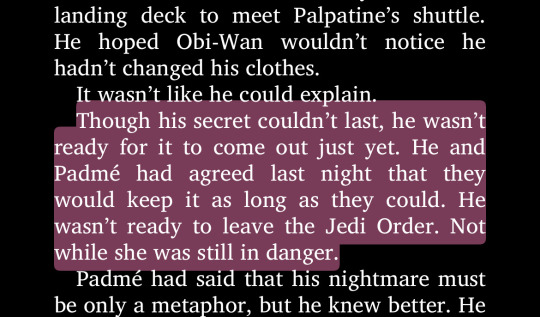
In this passage^^ Anakin also mentions that he and Padmé have talked about what would happen now that she was pregnant, and he says that they’ve decided that they would remain in their respective positions for as long as they could until the secret was no longer concealable. Another implication of how they HAVE talked about leaving their duties behind in favour of running away together. The result was made from the circumstances Anakin was in of course. He wanted to stay in the Order longer to find a way to save Padmé. Padmé only wanted to keep it a secret to protect Anakin, so that he could stay in the Order. (No mention of herself or her duty.)
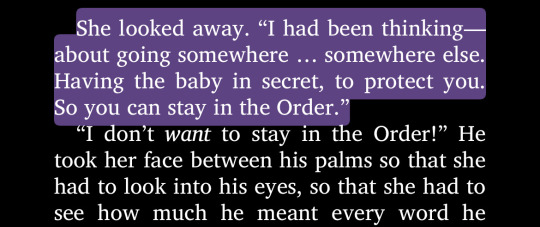
Padmé had already gone through the consequences her pregnancy would lead too, and she didn’t care for them. She says she’d be “relieved” of her senatorial duties, and she made her peace with it. She was ready to move on and begin her life with Anakin. She was only worried for what everything would mean for Anakin. She was worried what it would do for him, and he, of course, decided that he didn’t care either. He also just wanted to run away with his wife and be together as one big family.
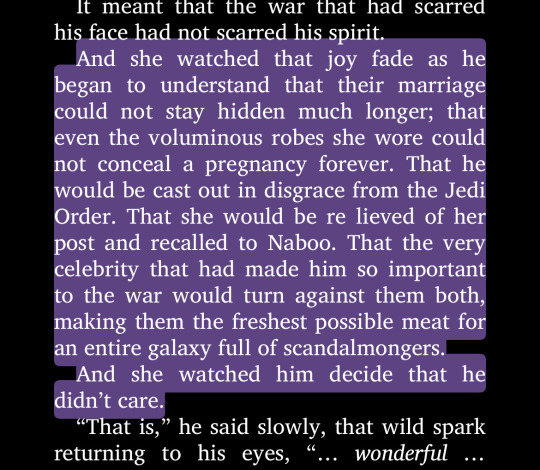
In Padmé’s words:
“Come away with me, leave everything else behind while we still can.”
#star wars#anidala#padmé amidala#anakin skywalker#sw novels#revenge of the sith novelization#padmé study#anakin study#meta#character analysis#auri wanted me to refer to the parts of the novel that imply this#so thought i’d put it together today#star wars: dressing a galaxy
270 notes
·
View notes
Note
Tell me every reason you enjoy Zootopia enough to give it all the rewatches you do.
Every? Oh boy.
Good Story
Perfect Characters
Visual Appeal
Earnestness
Let me break it down.
1. Good Story
Zootopia’s main point is: “Try to make the world a better place by realizing we’re fundamentally the same.”
That’s a really good main point.
It has the benefit of being true. Right now our culture is super into “self-identification,” and this crazy contrast between, “I want to be able to identify as something special” and “Now that I know what categories I fit in, I can choose who’s ‘one of us’ and who’s ’not one of us.’” Okay well that sounds pretty and I’m sure it fulfills some emotional need at some point, but it’s actually super divisive, and self-serving, and it’s the seeds for all prejudices. Including racism.
Do we have differences in origins and experiences? Yes. Of course. Do we also have some fundamental things in common? Yes. Of course. Which truth are you going to give the highest priority to? If it’s “no, I’m a prey animal, I know exactly where I belong, that’s who I am, that’s how I dress, that’s my compass for how I interact with others” then you’re getting all your security from your “sense of self,” and being able to understand what that is…which is just a fancy way of saying “I’m all about me. My own perspective informs everything I do.”
Anyway. Zootopia’s message was super true.
And the coolest thing about it is that if only Judy were in the wrong, and the other half of the dynamic duo, Nick, was this open-minded, un-prejudiced guy…and she just hurts him and has to apologize…the movie’s message wouldn’t be as well-communicated.
They have their prejudices and their hurt-from-being-prejudiced-against in common!
They’re the same…because they’ve both felt what it’s like to be treated like they’re not “the same.”
Nick isn’t the only character being mistreated and written off because of his species. The whole first half of the movie is about Judy being mistreated and written off. They think she can’t be a cop because she’s little and cute and a prey-animal. They think Nick can’t be trustworthy because he’s sneaky and small and a predator.
So literally…if Judy represented one race, and Nick represented a completely different race…the movie would be saying that both those races are discriminated against. They even have discrimination in common. AND, if Nick represented men who people make assumptions about because he’s a man, and Judy represented women who people make assumptions about because she’s a woman—the movie would be saying that both those genders are falsely judged.
I mean. Wow. Right now, your movie is either pro-woman or pro-man. Right now, your movie is either BLM or white-supremacy. Everybody’s lining up on one side of the line or the other. Zootopia says, “it doesn’t matter what character you’re looking at, from the elephant that can’t remember anything to the two main characters—every single one of them has fundamental things in common, and one of those things is that they all live like they’re in their own special category. When actually, they’re all fundamentally the same.”
I don’t want to keep beating the dead horse. But I have a post somewhere that lists every background character and points out that each animal is the exact opposite of what you would assume they are based on their animal-stereotype. The otters are never shown being playful or snuggly, only traumatized and ferocious. The cheetah is fat and slow, not quick or even quick on the uptake. Etc.
Even if you look outside of characters—look at the sets. Look at the environments. The whole city is designed “for animals, by animals.” But it’s in neat little segments. The animals organize themselves by habitat. Of course, in one sense that’s practical—the polar bears can’t live in Sahara Square, etc. but the point is, by making Judy and Nick, the main characters, small animals, in a city where everything is built to accommodate by species—UGH this is so good—they have to figure out how to problem-solve in situations that weren’t made to accommodate them.

Little Rodentia? Judy has to avoid stepping on all the mice or knocking over their buildings. Parking tickets? She has to figure out how to jump to reach bigger animals’ windshields—or she inconveniences smaller animals because the tickets are all printed at the exact same size. Stuck in a cell? The guards didn’t think about the fact that small animals can fit down the pipes made to accommodate big animals.

Zootopia is a city advertised to be where all the animals can come together. But the way they do that is by trying to accommodate every species’ preferences. So then actually while they try to come together, everything from their cars to their districts remind them of their differences. The whole idea is that they prioritize the wrong truths. Yeah, mice can’t drive giraffe cars—but they still have “driving” in common. See?
And oh my word. Initially it was supposed to be a spy story. But they changed it to a buddy cop story. Why? Well because justice doesn’t discriminate. Or at least, it’s not supposed to. So then there’s another lens to look at the story’s main theme through.
It’s just that every layer, every perspective you look at the movie from, is just hammering that truth into you: “Try to make the world a better place by realizing we’re fundamentally the same.”
2. Perfect Characters
Every character is so well-thought-through in this movie, even the side characters. You get the feeling you could watch a whole movie based on the side characters, because that’s the amount of love and nuance built into them.
Look at the main ones, though. Bellwhether is supposed to be soft and a follower. She’s a sheep. Instead, she’s hard and bitter—and she’s a leader. A villainous leader, but a leader, nonetheless. Even as she tries to keep animals divided based on fear of their stereotypes, she’s not fitting her own stereotype. Her voice actress has this strained, half-hoarse, but sweet voice. Like you can tell that this character has spent a lot of time under pressure and trying to manage appearances. Appearing like she’s fine, and she can handle it—until you realize that the appearance she’s really managing is “the cultural fear-based identify of the city.” They dress her in plaid and flowers and she’s a farm animal, because that’s the kind of character Judy would be most likely to trust. But she still has green eyes, and jagged teeth, so that when she does start making evil expressions there are some caricature-pieces in there that come out and accentuate that.

Nick Wilde—everybody’s favorite—is supposed to be sly and smooth and shifty. And he is. He’s a fox. But he’s also brave, helpful, and trustworthy. The first time you see him is when he’s dodging out of the way of a bigger animal ignoring him and about to run him over. Well, that’s important.

Because Judy knows what it’s like to have to get out of the way of larger animals, because they overlook her.

So right off the bat, this character she has to get along with and work with, this character who furthers her development and nails the main point, is introduced in a way that has something in common with her. But he’s also introduced in a way that gives her an opportunity to focus on a different truth—that he is different from her. Because the sheep is yelling that he’s a “fox.” Right away, we’re back to species-as-identification.
And that’s what the movie does, all the way through. It presents new animal characters, and with those new animals characters, more than one thing is true at a time. And Judy has to try to focus on which truth is more important. “Try to make the world a better place by realizing we’re all the same.” Yes, Nick is a criminal. But Nick is also brave, helpful, and eventually, becomes trustworthy.
Judy, too. Judy is an incredibly well-done character. Because she believes, in her head, that anyone can be anything—which is not what the movie ends on. In fact, she goes from saying, “anyone can be anything,” to saying, “we all have limitations.” It’s not true that a fox can be an elephant. But it is true that a fox can be trustworthy. Figure out what’s true, and try to make decisions for the better, based on that.
I could talk about character design and acting. Ginnifer Goodwin gives just the right amount of smugness and self-confidence to Judy without making her unlikeable—you don’t realize she’s smug and her self-confidence is misplaced until she does, when she fails to make the world a better place for Nick.
Judy wears tight, actionable, well-fitting uniforms for the whole movie. In her civilian clothes when she comes to Zootopia, she’s wearing athletic t-shirts and shorts. Ready for action, that’s Judy, even in her civvies. Meanwhile, Nick? Nick wears loose-fitting clothes. Loud, patterned clothes that don’t match. Like he didn’t even what, ladies and gentlemen? Like he didn’t even TRY. “Try to make the world a better place…”
Because when you meet Nick Wilde, he’s long since given up on trying, in life. So his character design reflects that. He rarely even stands up straight, or opens his eyes all the way—his default is drooping. And guess what?
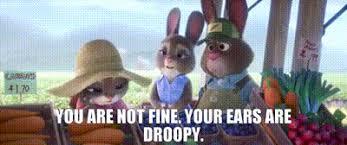
When Judy “gives up?” Quits her job? Goes back home? Stops trying? Her civvies aren’t ready-for-action, trying clothes. They’re loose flannels. And her “ears are droopy.”
SERIOUSLY, you can find things like this in every corner of the movie. For every character. Not one character is a throwaway, not in voice acting, not in design, not in animation, and not in narrative.
3. Visual Appeal
Which leads me into this point—no other animated anthropomorphic animal movie is as visually appealing as Zootopia.
What Zootopia does is it matches the best of the best anthropomorphic animal designs from past Disney movies:
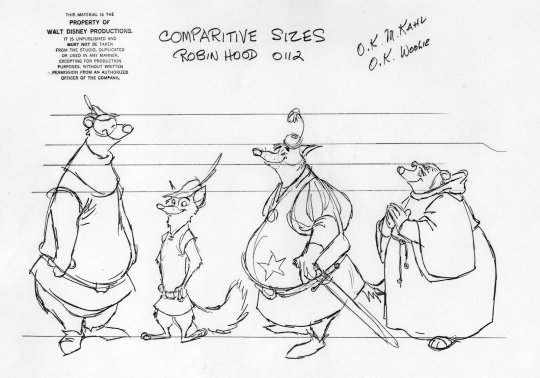
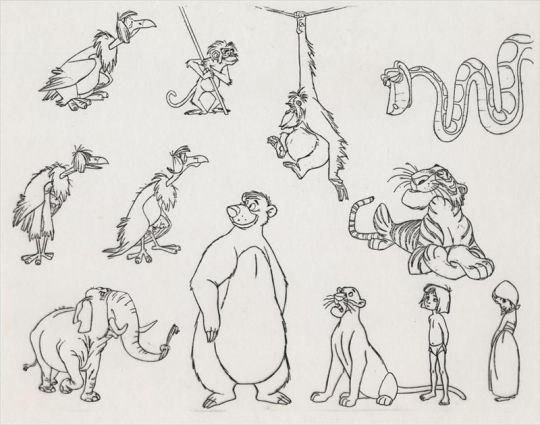
And they marry it with this incredible intentionality with modern CGI.
Did you know Disney invents its own software for things like fur textures?
The sheep’s wool, the velvet pig skin, the fox fur, the bunny fluff—it’s all completely different textures. There’s no one “fur” covering all the hairy mammals.
Nick isn’t just orange. He’s orange with deep red and dark tufts. Judy has black tips to her ears, too—which helps the two of them look like, in some sense, they belong “together” in every shot.
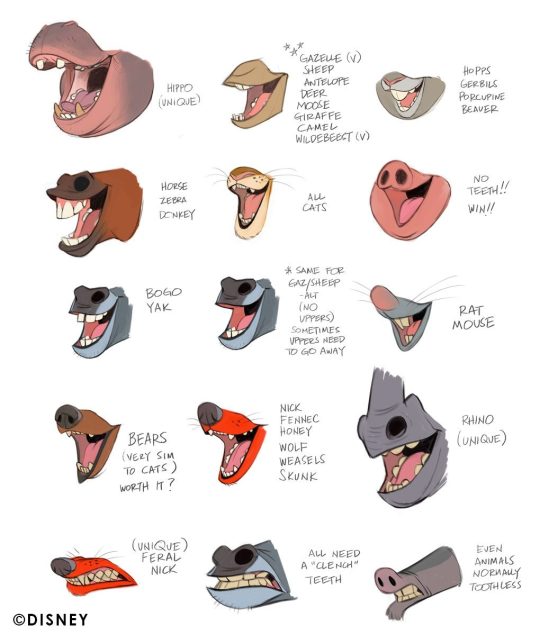
It’s so important to the movie that the animals feel like animals that they worked this hard to do this. And then that extends to the textures of the snow, the ice, the sand, the wet leaves, the grass, the fire.
Every character moves like their animal, and like themselves. Nick and Gideon are both foxes, but they don’t move similarly at all. Gideon is aggressive and glowering and physical. Nick, again, is slouchy, leans on everything, completely non-confrontational.
Other anthropomorphic animal movies like Sing or Puss in Boots—they’re not doing both as well. Zootopia is appealing, without sacrificing realism completely, and without cutting character acting.
The lighting. Nope. This post is too long, I can’t talk any more.
4. Earnestness
There is no disingenuous moment in this movie.
The animators are never lazy. They always go for the challenge. They don’t cut corners. Have you ever seen “Over the Hedge?” I like Over the Hedge. But I watched it recently and it’s crazy how many shots are strategically placed so that the animators don’t have to solve a certain effects problem.
For example, when RJ sprays Hammy with cool whip to make it look like he has rabies? He doesn’t. You never see the cool whip leave the can. It just cuts away, then cuts back when RJ is pulling the can away from his face. The shots are also cut so that you never have to see gas actually come out of Stella—and you never see Vern’s full body as he gets back into his shell, just the upper part of the shell as he wiggles it around, going through the motions of putting it back on.

That’s because that stuff would be painstaking to animate. Any time one character has to interact with props or substances (especially liquids) that are not part of their model, it’s harder on the animator.
Zootopia? We’re getting full-on views of characters getting wet, fur and all, characters touching various objects and elements, foam coming out of the mouth, new clothes, new set pieces, multiple models, huge crowd shots of different animals in different outfits, all with their own movement patterns and acting.


And all that hard work and effort, aimed so totally at the main theme of the movie? Making sure it looks as good as it can? Not just that, but the way it’s written, the acting, is so genuine. They don’t hold anything back. They don’t shy away from real emotion.
Judy Hopps’ apology scene is brutal. She’s crying, having a hard time finishing a sentence, her voice is all tight. It’s not pretty, it’s not romantic, it’s like…ugly crying. And her character is wrong in a super embarrassing way. They're not afraid to go there. The writers, the actors, the animators—they’re not afraid of being too vulnerable with these character flaws.
So many movies, especially kids’ movies today—they just pull up and shy away from being real through their characters. They think a quick sad facial expression will get the point across. And it does. The audience gets that the character feels sad about whatever the circumstance of the scene is. But not as powerfully. Because you didn’t put as much work and heart into it.
Zootopia is all heart, from work ethic to vulnerability to the filmmakers enjoying what they’re doing, enough to make it as good as it can possibly be. I can’t explain it better, other than to say, you feel like they would’ve been happy making this movie much much longer than it was. You feel like they’re cramming every bit of joy and passsion into every little joke, every side character, every hair on a CGI bear.
There you go. Long post, you did ask for it
#Zootopia#Nick Wilde#Judy Hopps#Zootopia appreciation#anthropomorphic animals#Fox#bunny#Disney#Zootopia 2#Jason Bateman#ginnifer goodwin#byron howard#meta#character analysis#design#over the hedge#puss in boots#sing#movie#animation#character design#character study#critique#review
219 notes
·
View notes
Text
I think one of the reasons I'm absolutely insane about Jun Mochizuki's work is because she's the only person I've seen do a perfect execution of the "abused becomes the abuser" trope.
All of the characters in Pandora Heart and Vanitas no Carte are incredibly morally complex. They're heart wrenching, relatable, endearing, aggravating, and endlessly flawed.
MochiJun puts us in the uncomfortable position of confronting that victims can be perpetrators, that those who are hurt can hurt others, that sometimes, people you love are bad, and sometimes you love bad people.
Abuse is never justified; it's handled by different characters in a variety of ways. It's repressed, reciprocated, passed on, and stopped. MochiJun shows victims become awful people, not inherently because they were abused, but because of who they are as people and how that shapes the way they deal with abuse.
She shows victims as the complex people they are beyond victimhood. There are characters who are just and kind after facing abuse, and ones who are twisted and cruel. Most delightfully, she brings us characters who are both.
The heroes of her stories choose love, gentleness, compassion, and mercy. She shows that our choices matter, that our relationships are integral to who we are.
I think of how some of the characters, in spite of these forgiving traits, are not required to forgive their abusers in order to be seen as virtuous figures. They're allowed to stand their ground, even if it's violent to do so.
I think of how, at the same time, some characters are loved despite being abusive, because a tender character sees more in them than evil. Because abuse comes from people, and people are endlessly complex.
I think of how the heroes of the story tear themselves apart for the violence they inflict, and are shown the most painful love in return. How that love often comes in the form of calling them out on their bullshit.
I love the love in Pandora Hearts and in Vanitas no Carte because it's painfully human in the face of horrors beyond mortal comprehension.
I love the flaws in the characters because they're painfully human despite some of these characters' otherworldly natures.
Jun Mochizuki doesn't show us the abused becoming abusers to give us the idea that abuse is an unstoppable cycle, but rather to show that it is stoppable. To show that people have a choice in who they become. And that's one of the most wonderful and terrible things about people.
#alkafdjklfjklfdjfk i'm so normal about mochijun's work i promise#pandora hearts#vanitas no carte#vnc#the case study of vanitas#jun mochizuki#meta#analysis
496 notes
·
View notes
Text

Steve is a character known for two things, his fantastic ability with cars and his temper. He’s one to fix and fight, he’s someone who’s much more practical with his hands. He’s so much more than his anger, hatred and liking to fight people… what I want to highlight is his sense of justice.
Sometimes he’ll fight for fightings sake— he and Soda are noted to have too much energy and feeling without any proper outlet for it but most other times he’s fighting for others. Steve is a protector at heart. Of their territory and of the other guys — out of all of them he’s the one to assure Johnny they’ll beat the Soc’s someday and finally have them leave him alone. It’s his sense of justice, of setting things right and Soc’s getting their comeuppance as that’s what would happen if things were just. But the world isn’t.
He can fix a car in record time and drive just about anything but he doesn’t stop there… he has a need to fix things. He also strives for this emotionally — he’s the one to assure Johnny, calls out Pony for bringing up Sandy, he tries to cheer up Pony with the hero thing and calls out Two-bit over complaining about his switch. Someone’s said it before but after Pony he’s one of the most emotionally open of the gang— he’ll say things how they are and how they should be.
This boy with his soft, bitter voice, sense of justice and at times brutal honesty. He admits to pain that others won’t. Steve is so much more than his temper…
#the outsiders#outsiders#outsiders book#charecter study#outsiders 1983#outsiders novel#steve randle#outsiders meta#character analysis
170 notes
·
View notes
Text
Just some thoughts I've been having about Jason and his ethics/motivations recently, because I'm back on that Jason Todd grind.
Jason's view on killing is one of 'calculated sacrifice', he believes that Bruce's methods are more than capable of stopping crime as it happens, but Jason wants to prevent it.
If killing five criminals means that Jason can spare a hundred lives and scare all of the others out of hurting innocents, that is a worthy sacrifice. He doesn't kill aimlessly or for pleasure, it is a measured act against the few to save the masses. Jason is judge, jury and executioner, Bruce's morals prevent him from acting beyond the first two - this is where him and Jason disagree.
If crime is a wheel that keeps on spinning, Bruce believes that the wheel is inherently wrong and should be stopped. Jason knows that the wheel is never going to stop spinning, and that it is better to control it than waste time trying to stop it all together. Where Bruce sees Jason's forcefulness as an unnecessary evil, Jason understands that the Batman symbol is needed - the world relies on people who can draw their moral lines in the sand and stick to them - but it also needs people like him.
It's easy to see how Jason's views have manifested. He spent his entire life being a victim of those trying to stop rather than prevent.
Catherine Todd dealt with drug addiction which ultimately rendered her dead and unable to care for her son - she may have tried to stop her addiction, but never managed to prevent it in the first place.
Willis Todd chose his criminal lifestyle over raising his son no matter how much Jason wanted him to stop - he didn't do what it took to prevent his son being left alone to fend for himself.
Bruce saw Jason's rage and fury as Robin and chose to try and stop it through arguments and discipline - at the time, he couldn't understand Jason's anger and as a result could not prevent it.
Bruce knew how dangerous the Joker was and dedicated an entire lifetime to stopping him - had he taken action to prevent the Joker's crimes, Jason wouldn't have had to die.
Bruce watches as his son comes back to life, a broken, angry shell and tries to stop him - he could never bring himself to prevent what happened from happening again, no matter how much he wanted to.
This is why the Redhood kills. Jason understands that it is not enough to simply stop crime. Something has to be moving to stop - as soon as Batman steps in there are already victims. Jason has been a victim - it's not a fate he intends to suffer again, and he would fight tooth and nail to protect those too vulnerable to prevent their own suffering.
#jason todd#dc#dc comics#red hood#meta analysis#character analysis#character study#bruce wayne#batfam#batman#bat family#dc robin
122 notes
·
View notes
Text
Saitama and depression; how OPM explores mental health

(TW: Depression, Suicide)
Many readers have more than likely noticed that Saitama seems like a pretty depressed individual, however it is never directly stated besides the above Saitama introspection where he acknowledges it and promptly puts it out of his mind.
This topic came to my mind after seeing this particular video about 8 oddly specific symptoms of depression by Dr. Scott Eilers that are not often talked about. We're going to talk about them and then some. Take note that I'm not a doctor or mental health specialist, I'm just writing meta so that's my disclaimer. :p
We'll start from the beginning and with the heaviest topic of em all related to depression and see how One Punch Man explores this particular mental health issue and move on from there.
Warning, long post ahead.
The most obvious sign of major depression is well, suicidal thoughts and suicidal ideation that Saitama exhibits as early as chapter 2. He never denies wanting to die by Crablante's hand.

Saitama also heavily relates to the guy who wanted to jump from rooftop while he was eating sushi and bluntly talks to him to pull himself up his bootstraps essentially as he did on his own, interpreting that sounding fake and sweetalking would not get through to the guy. (Salmon, Vol 7 extra)
Other signs pointing towards depression would be low energy, lack of motivation, self-isolation, hobbies that are low-energy consuming but stimulating like gaming, manga, watching tv and such, all of which Saitama exhibits... but another common depression symptom is Anhedonia.
"A diverse array of deficits in hedonic function, including reduced motivation or ability to experience pleasure, particularly from previously enjoyable activities."
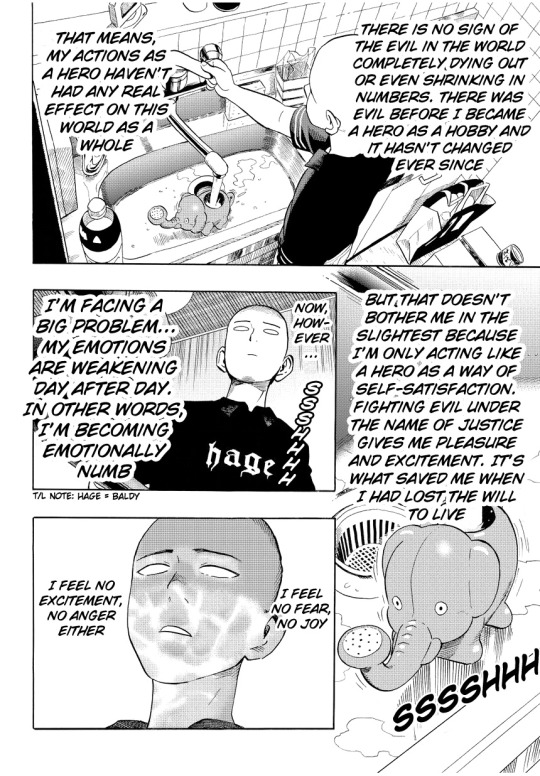
The doctor in the video describes Achievement anesthesia by the inability to feel positive emotions from achievements. Despite Saitama saving plenty people, he only feels a lack of accomplishment and probably frustration from feelings of uselessness. He used to take joy and satisfaction from helping people out in the past (Brushing up, vol2 extra), but the same and even vastly stronger merits now only serve to highlight how little he feels about them now.
A great contrast.
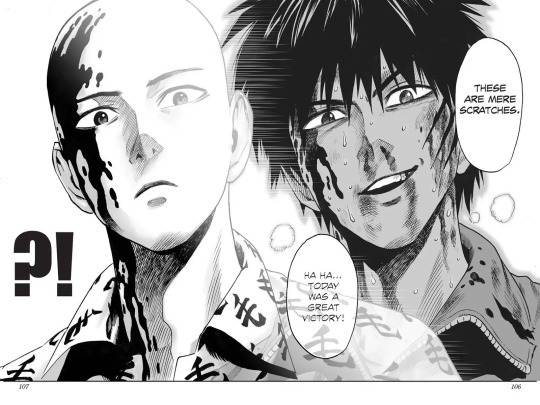
What was once a great victory, is now just yet another tuesday for Saitama. (One of my fave panels)
Even worse, he does not get brownie points for being a good, upstanding citizen. He gets no money and rarely appreciation for the good he does and that just accumulates his depression when his neighborhood emptied. And with his power, he also gets to clean up the mess because he has the power and it's the right thing to do, be it from picking up litter to saving little kids from getting kidnapped (What can't Be Bought, Vol 5 Extra). But such also breeds jealousy when everyone else reap the rewards, reap the fame and the fans and the good reputation.
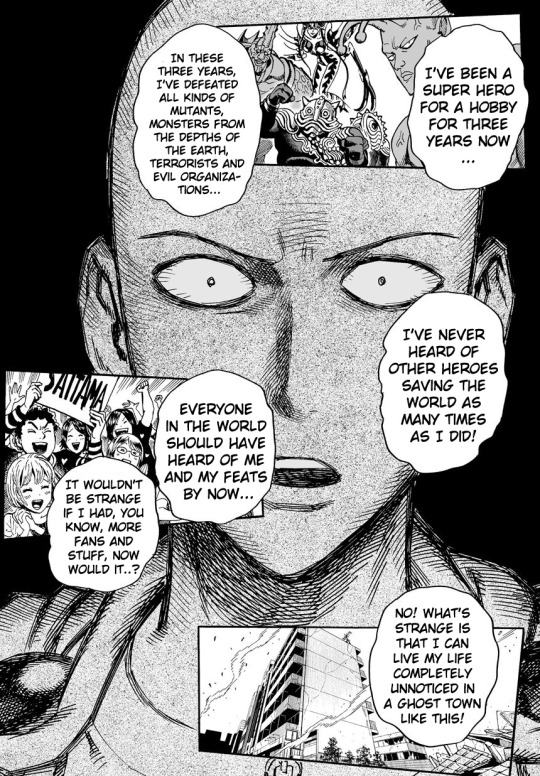
The stress of trying to be a good person with moral integrity in a bad world is a heavy load, which can lead to depression, lack of motivation and things like compassion fatigue. The more he tries to find something worthy of doing, the more he invests in it, the more he keeps getting disappointed by the lackluster feeling and reception he gets.
Saitama beats himself up for moral failures, which is a contributing factor for his depression, such as when he was in the tournament and monsters were running amok, despite not having no prior knowledge of monsters around the area. The complete lack of explicit improvement on things he wants to do however, is the most sore point. He didn't learn a thing in the tournament and just felt like he was wasting time, conditioning him to think that self-improvement is just a waste of time on itself because he won't learn anything anyway.

Being good at something naturally makes one feel better about themselves and Saitama's low self-esteem and for instance, lack of skill in gaming, creates friction and Angry perfectionism. One especially doesn't want their few fun hobbies to feel like hollow endeavours. Being competitive, one would want to git gud and accomplish growth and getting constantly trashed by one finger keeps driving it home that Saitama is not actually good at this thing either, something that he wants to enjoy doing. Saitama also constantly projects his bad mood and this insecurity by trying to trash talk King, without much success. King is such a good friend though that fortunately the does not seem to mind Saitama getting pissed at being a sore loser. True pro gamer bro.

Lets pray Saitama never finds that mmorpg's have hardcore raids, he would never be able to leave the house again. 😂
-*-
Which brings us to the last point in the video, Addiction to emotion-creating activities.
If Saitama was any less strong willed and less restrained and if he actually had money to spare, he would 100% develop a gambling addiction. Keep this man far, far away from social media too.
However, as soon as something...or someone...breaks through that fugue and creates actual emotion, one can develop an addiction to the thing because our brains want/need that dopamine fix.
Genos just so happened to barge into his very lonely life life and became that someone to create that emotional connection with and Genos provides too when he's taken over cleaning and majority of the cooking and even finances, something that people with depression struggle to accomplish. When Saitama cooks, it's usually not very difficult dish to prepare either, chop ingredients and toss them into the pan. Saitama also loves food and needs money to feel like he's financially secure, being unemployed, and has little social contacts, so it's like triple-dipping in the dopamine sauce. Nomnom, feelsgoodman.
It's all well and good until shit gets real and your main source of feel-good emotional connection just dies. Oh and it's your fault too cuz you played around. Good job Saitama. That's a deadly amount of guilt and a PTSD as a cherry on top.

Genos' continued existence is essentially applying bandaid to a bleeding head wound that's Saitama's mental health issues.
Ultimately, I do wonder if ripping off the bandaid is why Saitama wants to get back his private space away from Genos, because he subconsciously understands it's not very healthy to be so emotionally dependant and Genos is just as obsessed about him. The allure of social contact and benefits are great, but so too are the detrimental effects, among them complete lack of privacy which is a nightmare for a private introvert like Saitama.

(Yes yes, it's still pretty dang funny, but it's still invasion of privacy)
-*-
Last example of Saitama's depression I want to touch, thanks to @gofancyninjaworld for the input, is Saitama's forgetfulness, a memory disruption if you will.
"Depressed individuals typically show poor memory for positive events, potentiated memory for negative events, and impaired recollection."
It is a running joke that Saitama has difficulty recalling names, which may be entirely normal because he does not really care to remember names for people he's improbable to meet later and emotional connection and repetition helps us memorize things better (such as Genos having to repeat his name upon introduction), however Saitama has also showcased potentially impaired recollection for events that happened just moments prior.

(Again, a great contrast. Show, don't tell, where one shows obvious signs of depression and another...not so obvious, in the same panel, in a humorous way to boot. Masterful way of tackling heavy topics, in my humble opinion.)
Genos worries for his memory in the Majin drama cd 1 and often tries to accomodate for his lapses of memory too, be it long ultimate attack name phrase, marking special sales or whatnot. Saitama forgetting to take out trash and forgetting names is normal, but it may be exacerbated by his depression.

The more telling part is probably the fact that even when his memory is jogged, he still does not remember Flash's name. It's like he never registered the name in the first place, maybe he did not bother because he thought it wasn't important but it does not appear he's trolling here and legitimately does not remember. Though he does remember the nickname he gave for Flash instead, which is funny. He made it up on the spot and it's hilarious, so it stuck.

The less emotional connection one has to things, the less likely we are to remember those things, such as the monsters Saitama kills are blurred together because he feels no self-satisfaction from killing said monsters and protecting people.

In the sense that memory block can also be a trauma response, ONE makes Saitama's complete lack of recall of the ominous future a running joke in classic ONE fashion. It's either that or time shenanigans. Or both, both is good.

Last but not least, Saitama also shows that he recalls little to no appreciation from helping people, despite the rare occasion where he receives gratitude from directly intervening and he definitely remembers the more negative events better, such as when he complained about going unnoticed and not having fans. (Hobby and work, cpt 15). He can recite the story to Genos when asked but there does not seem to be instance where he mentions such without prompted.
All is not lost in the memory department however, since Saitama shows a potential memory recall improvement in the recent retconnect chapter Tenninto where he recognises the martial art dudes from the tournament he was in. It might be nothing, as it was retconned too but ONE is definitely keeping it in mind.

It is quite fitting thought that the video talks about how "normal people look like superheroes" because they have the energy and motivation to do daily tasks and OPM is a superhero manga about a person who's the strongest hero but he barely considers himself a hero. ONE has also said in an interview that just living a "normal life" is hard and OPM definitely reflects that sentiment.
-*-
Saitama is slowly getting there though. He seems happier, more confident, more outgoing and a larger array of emotional displays, to the point that some people in the fandom have voiced their complaints about the apathetic hero apparently smiling too often. To that I say, character progression is a thing and a good thing at that.
Saitama even has better gait when he used to slouch and drag his feet that bespeaks of his increasing self-confidence. Less self-doubts + more confidence = more gains.

He was also able to calm down despite losing heavily to King in a fighting game and still feeling very irritated after the fact, but offered his blunt advice to lift weights anyway, which would indicate better emotional regulation. His attention span has also seemingly improved, despite the Knight yapping away for an entire panel. (Worlds I know nothing about, cpt 193). Then even when the entire thing of releasing an epic monster was just as boring monster encounter as the rest of them, he seemingly took it as a learning experience of expanding his world-view instead of complaining his utter boredom. He also recalls the tiny tidbit about Flash's utter lack of finding his way in the underground maze and remembers Blast, his name and thanks him for getting them out of the underground hole.

(Mathing is hard though but this may also be a 4th wall breaking meme because we've never seen Saitama defeat sonic 14 times on screen. Are we being gaslit? lmao)
-*-
Closing thoughts, we've not seen the last of Saitama's mental health journey, far from it. Nor have we adressed that legitimate concern of PTSD in the background and I'm sure it will pop up at some point or another...too much of an opportunity for ONE to just ignore in this master thesis of a manga about issues he feels are important.
Anyways, thank you all for reading this far, it's been a while. :D
#opm#one punch man#saitama#genos#opm king#opm meta#flashy flash#tw suicide#tw depression#mental health#opm manga panels#my own work#long#character analysis#character study
161 notes
·
View notes
Text
Laios Touden and autism; admiring the non-human
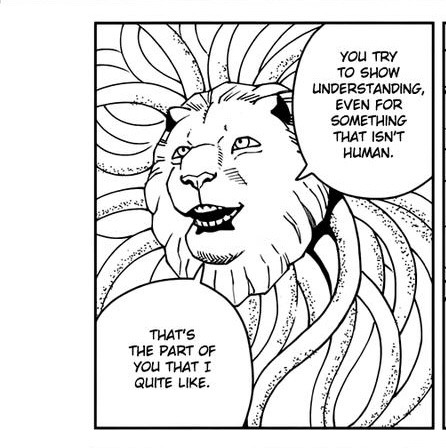
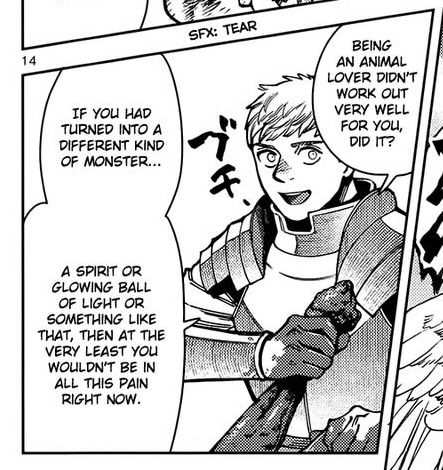
Do you think people exaggerate when they scream about Laios being autistic? Do you feel like it’s weird that so many people including autistics are so set on Laios, the problematic (but incredible and kind) king TM, being the most autistic that has ever autisticed? Why do we cheer on autistic people wanting to be monsters?? Isn’t that weird?
Well, of course it depends on the way it’s done, it can be done quite offensively, but long story short Kui blew it out of the park. The thing is, autistic people really do like monsters and animals and robots. Nonhuman does not mean subhuman, it just means Other. Feeling a connection with them has been shown to be an extremely common autistic experience for that very reason.
Because some people don’t understand why we autistic Tumblr Laios stans cheer “autism! Autism!” whenever he talks about monsters and feeling alienated to humans so! Here’s a post about how yes even research papers are analyzing the special connection we form with animals. I’m not even joking but Laios Touden & the mass cries of relatability with autistic people he gets and all the love for him could be used as study material and evidence for future papers because the link is that strong. Oh also I think it’s notable that being autistic and undiagnosed vs diagnosed makes a huge difference. In my experience as someone who was undiagnosed up until 18, it’s even more alienating to not know that there’s a reason why you’re different, being gaslit that you’re ‘normal’ and you just need to try harder and get with the program, etc. Personally when getting diagnosed I went through the 5 stages of grief because the thought of having been fundamentally different all your life (a difference which you will never be able to change) and mistreated for it when you weren’t “wrong” all along makes you unload all the anger and sadness and loneliness and sheer trauma you’ve built up over time. Like it’s world shattering.
So! Back to seeing dogs as family. Also I implore you to value experiential evidence when it comes to autism and other neurodivergences because brains are complicated and neurotypicals not being able to understand us well even with scientific research is like, a whole thing even though we’re right there speaking about how we feel and being right every time because the topic is literally us and how we experience the world.
Disclaimer for this whole post that, of course, no group is a monolith and everyone has different experiences or can diverge from the norm of the group, and that doesn’t diminish the validity of either side! Like, I know autistic people who have trauma with dogs and hate them. But, trends do happen, and in this case... Autism is very “My experiences with humans make me feel dehumanized in a bad and lonely way so instead I’ll dehumanize myself in a good and inspiring way”.
“I was treated like a failed human my entire life and you’re surprised that my response was to become a dog.” -Patricia Taxxon
It’s literally well recorded that autistic people relate to animals more than humans globally. With this post, besides spreading autistic Laios truthism and explaining why the portrayal hits so deep for so many, I want to show in what way this is a very specific experience and not looking at his character through an autistic lense really misses a lot of why he’s everything that he is. (Tacking allegedly onto here for legal reasons, different interpretations are valid etc etc /gen). This honestly isn’t super long though.
To define an important term, anthropomorphism in the studies and in this post means to attribute human traits to the nonhuman, which not only includes anthro furry designs but also animals irl, inanimate objects, and animated media as opposed to live action, to humanize them and empathize with them.

Paper: https://www.liebertpub.com/doi/10.1089/aut.2019.0027
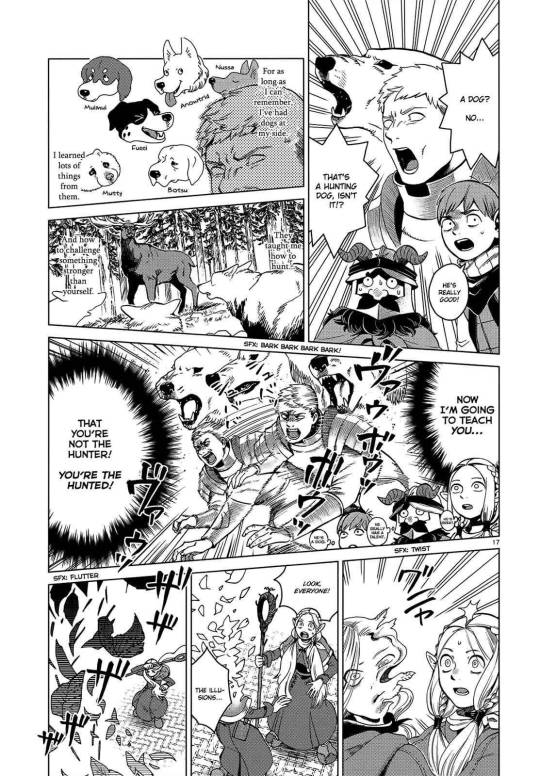
“Dogs taught me how to hunt and socialize and work in groups”, Laios having internalized body language... So real so real. I, too, make a great dog impression. And I want to emphase the part that it helps greatly develop a sense of emotions and relationships! For Laios, he didn’t get along with kids his age, it was him, Falin and the dogs against the world. Since it’s a group of dogs too, it taught him group dynamics and social hierarchies (like with Falin being considered as being below the dogs in authority according to the dogs rip), and the importance of group coordination when hunting.
For me, I cannot like, concisely explain just how much animals were important to me developmentally. I also grew up with dogs, but like I vividly remember encounters with like hamsters as well just radically shaping my understanding of boundaries, the importance of giving something space and the way you interact with them and respect their side of it. Unlike humans they don’t really mask how they feel, it’s direct cause-effect reaction and data gathering. There are no words involved, so the focus on having a perfect phrasing and tone is gone, leaving just pure interactions.
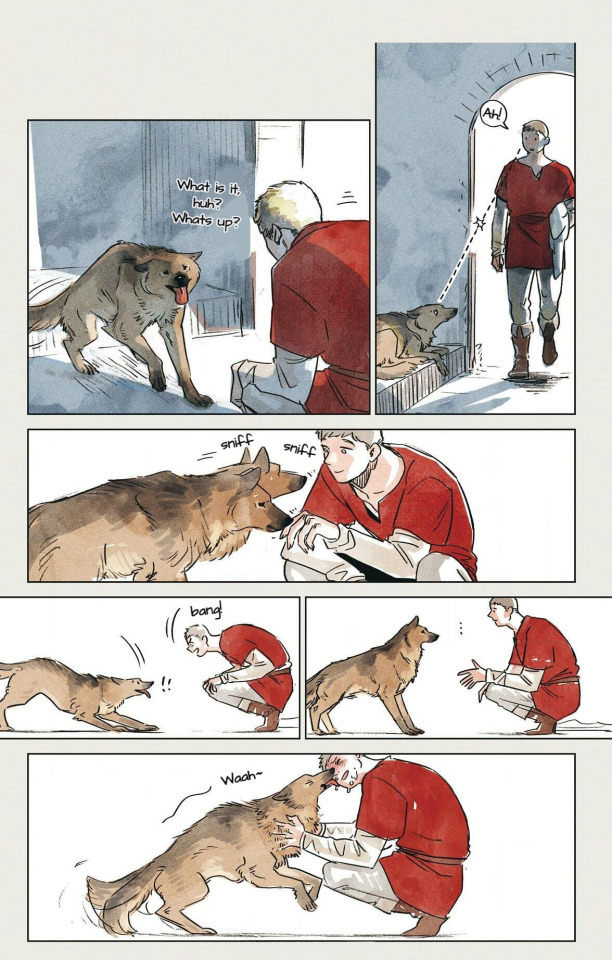
There’s also no reason to mask how you feel either, and you don’t have to feel silly over wanting to form a connection and it showing, what, is the dog gonna laugh at you because you obviously want to make friends with it? Toshiro or Kabru might, but dogs and cats will just tell you to fuck off and leave it there worst case scenario. I often say that I think one reason Marcille is special to Laios and he feels comfortable around her is because she emotes INTENSELY, she gestures, she puts her whole body into it, her facial expressions are pretty exaggerated and her ears even emote too- like with a dog’s ears!
I think there’s def also things to be said about how he gravitated towards Izutsumi at first, all excited, was eager to sleep in the same bed as her, but in the Izutsumi sleep rating chart we see they really just casual and chill so it’s not a Laios talking to Shuro deep into the night situation just a “I like sleeping besides animals” situation and that is enough to hype him up. I love how he pet her in the extra about why Chil let her sleep with him too. He’s just so transparently eager to befriend her, even if in the end they weren’t all that compatible and he accepted that.

There are honestly so many examples I could give for this. Like Grandin the famous cow lady.

More about autism & empathy:
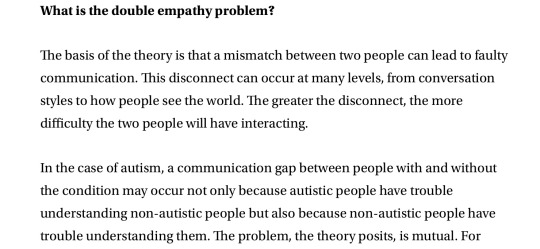
https://www.spectrumnews.org/news/double-empathy-explained/ (Also mentions a study in which groups of autistic, allistic then a mixed group played a game of telephone and both singular groups had similar levels of information retention, but the mixed group was significantly worse. As an autistic person yeah duh, obviously autistic people are different from one another and can have plenty of interpersonal issues, but communicating with other neurodivergent people feels pretty intuitive and straightforward and comfortable. One of the reasons why neurodivergent people tend to naturally gravitate towards each other I suppose.)


^ Paper: https://www.ncbi.nlm.nih.gov/pmc/articles/PMC5932358/ For good, extensive summary of why we relate to animals so much you can go to the “anthromorphizing and asd” section of the paper. This paper extends to our widespread liking of cartoons and robots as well. Ok so this is a whole thing I won’t get into here but this is a big reason why a lot of autistic people are agender leaning as well. Genders and queerness in general is a lot about social constructs, and being queer is being marginal to these, not fitting into boxes or challenging those social norms and conventions. Queerplatonic relationships are a great example of this, where the framework of the relationship is platonic but the intangible nature of what it is exactly is the point, not familial not anything but everything at once too, just adoration, I like to say having pets is a bit like it as well, bc obvi it’s not romantic and often not fully familial, very platonic but also sooo much cuddling and adoration and kissing and whatnot that you wouldn’t typically do with a friend or family member. I’ll talk about qpr and labels another day though.
I got carried away but queerness in Dunmeshi is something I 100% want to make a big post on one day. Experiencing the world with different guidelines and not registering things to have the same boxes, sigh. Personally I also relate to Laios on a gender level, “cis by default because I don’t care all that much but if I were to dig deeper I’m probably otherkin and I want to be socially associated with traits of monsters and animalistic rather than man/woman” sighh hard to be a cryptid in this day and age. I wish we had a term like furry but for monsters, I want to be in the fantasy or folk tale genre ty, like changelings. Goshh changelings... You know, the irl myth where people said their neurodivergent kids were fairies’ children instead of human. Diminished physical sense of self means I see myself as some unknowable black void aesthetic wise, but like in a way that simultaneously makes me feel seen. Like becoming a monster, losing your sense of self but also somehow just being simplified and seen for what you are, it’s weird to try and explain. This post is more about relating to the nonhuman than about seeing yourself as such, but like connect the dots right, that IS an important point of Laios’ character. It’s because our brains literally work different than allistics which makes us feel as other, but also because of social ostracization and functioning in a different way than society at large, living in the margin of society, being weird and non-conforming.
Meanwhile, animals and social norms... Like ok, showing your neck and rolling on the ground to show that you’re friendly and harmless and play biting might not be proper. But have you considered that it’s also fun and feels very intuitive. Play with a dog in the dog’s way I promise it is so nice and freeing. Play tug of war and growl back when they growl. Hiss at your cat to tell them they do something wrong, engage with them on their level.
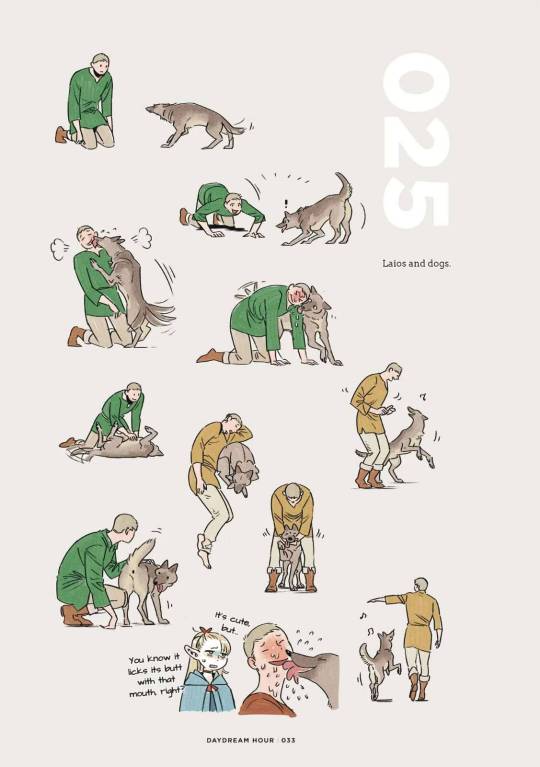
Autism made social life hard, but it made animals easy. Do you have anyyy idea how good it feels to mask all day every day and feel constantly misunderstood or like you’re doing a performance but then you can just, drop all of that in the company of animals and they understand you. They understand you. You form an understanding and rapport so easily.
And this whole thing with Laios is so explicit too, with the Winged Lion saying “You’re sick and tired of the human world”. Notice the choice of words. Sick and tired of the human world. Exhausted from the constraints, sick of the mind games. It really isn’t as much about loving monsters as it is about loving the nonhuman. Relating to them because you feel that you can actually understand how they work and think, and feeling like they could understand you back as well. Animals are safe.
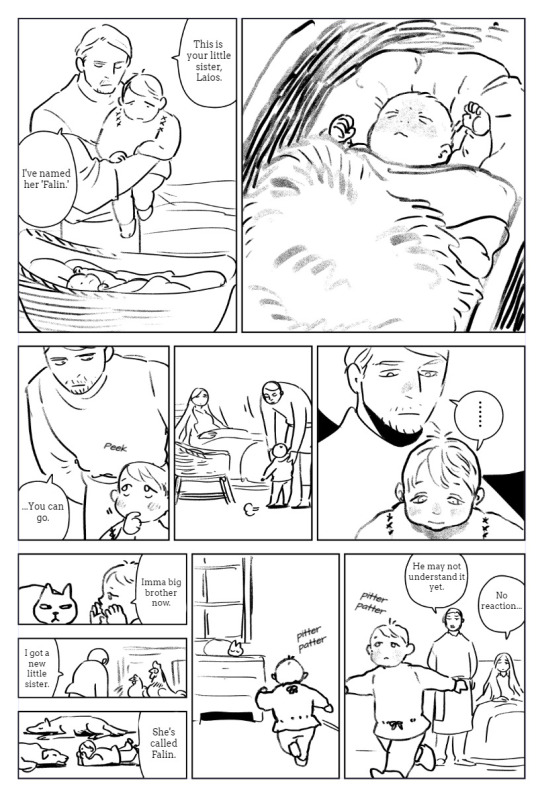
Like I could go on about how Laios admiring even just demi-humans like orcs is because they’re socially seen as non-humans more than any true physical thing, that they’re not bound by human society and its rules and live with their own lifestyle. But it would deal myself 1000 points of psychic damage and I am not ready to cry today. It’s idealization 100%, and like, Laios DOES want to be treated as human, to be valued, but it feels like an unreachable thing meanwhile becoming a monster is instant gratification and freedom and a sense that now no one will be able to hurt you in a way that reaches you, never again shall you be defenseless, and then if people dehumanize you then that only strengthens your sense of identity as a monster and UGHH ugh ugh.
And like. This post is a mess at this point but if you want to kinda delve into the more “why” then I recommend this Patricia Taxxon video essay. It starts out on a very different topic, but it’s all about autism and finding comfort in the inhuman. Long story short is othering made us like this also animals are just simpler to intuitively get along with.
So when I post this
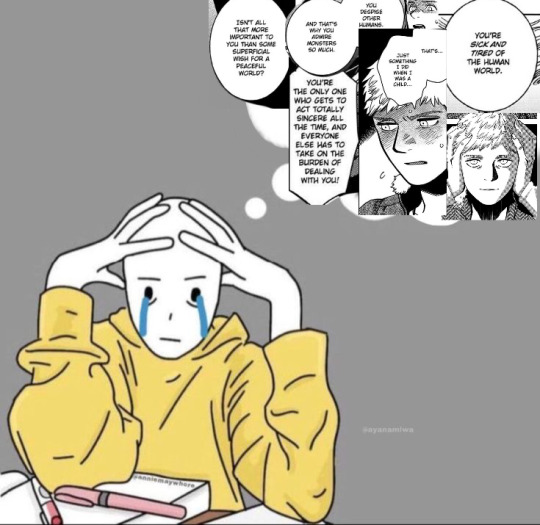
I mean it. I really mean it when I say he’s me. I have never felt so seen. So many conflicting emotions all wrapped so concisely yet so intangibly woven into the whole storyline so subtly.
Not being depicted as a monster of an human being for feeling/having felt that way?? The manga understands you. The world can understand you. Other humans can understand you. You can bond with them. You can. And I think that’s a big part of Dungeon Meshi too- Laios opening up to others about how he really is and his interests, and all the bumps on the way but how it was the only way to truly get to know each other and bond. With the climax being Laios confronting head on his complex with monsters and humans, and his monster-loving side and animalistic side being exactly what saves the whole world, what saves humanity. Because Laios does value his friends, does think humanity has beautiful sides to it, he wants to help it thrive and eat and become more accepting, carving out a kingdom for misfits and demi-humans. At the end of it, transforming into a monster and being free is a daydream fantasy, and the reality of it is that Laios does belong in the world as he is, and does receive and give out love.
If you enjoyed this you’ll probably like some of my other Laios analysis! Here’s an analysis of his succubus and what it says about his relationships with other humans. And here’s an analysis about his relationship with Shuro from his perspective.
#dungeon meshi#delicious in dungeon#laios touden#character analysis#i guess#dungeon meshi manga spoilers#spoilers#autistic laios touden#asd#autism representation#meta#draft so old it uses the old Tumblr post editor#it would be much better if i could put them side to side rip#i also wanna do an analysis trying to pin down his level of social awareness#i love that the monster story epic saga about misfits and your place in the world on an ecosystem level is just sooo autistic so perfect#this post has a weird structure but hopefully it can showcase some things and make ppl understand and others relate! I know we're out there#hiii therians how we feeling today. Brain chemistry is weird but ours is just wired different not broken#feeling self-conscious bc even with studies this is the equivalent of going 'trust me bro I get it' which usually doesn't go well with us#Humanity is beautiful <3333 Humans are social animals broski love yourself!!!
304 notes
·
View notes
Text
Fivela didn't come out of the blue

Just one interesting tidbit for film enthusiasts / TUA lovers / Five x Lila shippers out there: a while ago, this particular frame caught my attention. It bore echoes of something I had already seen in the past, but I couldn’t quite put my finger on it.
Then it came to me: of course, the poster for the movie The Graduate!
Notice how both Dustin Hoffman as Benjamin Braddock and Five are sporting the same tan shade of clothes, how both are positioned in the door frame, with the leg of their seductress / love interest / nemesis hovering starkly in the foreground.
Both female protagonists are caught as they are performing a gesture of an intimate nature: Mrs Robinson is rolling on her stockings in The Graduate, post encounter with Benjamin, while Lila is shaving her legs, pre run-in with Five.
And, of course, there’s the much debated “age-gap relationship” in common, hanging in the air – explicitly stated, in the case of Benjamin / Mrs Robinson, and subtly hinted at as far as Five / Lila are concerned (and yes, time travel factors in all this and is - as Lila so aptly put it - "a massive head trip").
I find this homage to be such an interesting, cheeky, apt visual foreshadowing of what is to come between the killer duo (pun intended) in the following season.
This is one of the many reasons why I respectfully disagree with TUA fans saying that the relationship was "unexpected" or "sprung upon" the viewers. Was it rushed and wanting proper development? Yes. Were there signs of where things were heading, well before the subway storyline, even prior to season 4? Hell yeah.
#five lila#five/lila#five x lila#fivela#5ive x lila#five and lila#tua#tua spoilers#meta analysis#tua meta#film studies
76 notes
·
View notes
Text
i could point out the beautiful parallels between nico's crush on percy, the crush he developed due to childhood trauma and intense hero worship and hung onto even after he thought his hero betrayed him, and annabeth's crush on luke, the crush she developed due to childhood trauma and hero worship and held onto even after her hero betrayed her, and how both of their crushes are commentary on their upbringings, nico's being how grief and internalized homophobia caused him to latch onto the beautiful hero that saved his life, annabeth's being how growing up neglected and unwanted caused her to latch onto the first person who showed her any attention and how that attachment only strengthened in their shared grief, and how those parallels extended to show how their respective attachments left them vulnerable to manipulation yet ended up not joining the dark side, ironically in part because of percy, either because of the crush (nico) or in spite of the crush (annabeth), and how those crushes contributed to their overall character arcs, nico's being to learn to let go: of grudges, grief, and his own self-hatred as a two part climax on that one page of boo and the cocoa puffs in tsats with will being the catalyst to making him see his own worth, annabeth's being to learn what real, healthy love looks like (a spot of irony: percy taught her this, which is contrasted with her typically being the person to teach him stuff) in contrast to what she ultimately got with luke which was manipulation, because luke, also being a neglected kid, never learned what healthy love looks like, but you guys are not ready to hear that so instead i'll just try not to cry at the hypocrisy of the pjo fandom's obsession with nico's crush on percy while refusing to see annabeth's crush on luke as anything more than a disgusting mistake
#i know a lot of it is because of the age difference but the age difference is part of the theme in annabeth's case#y'all got half way there. you know it's gross. please please try and take it a step further and think about why rick would add it anyway#rick riordan#percy jackon and the olympians#pjo fandom#pjo hoo toa#percy jackson#percabeth#solangelo#annabeth chase#nico di angelo#luke castellan#rrverse#pjoverse#pjo meta#percy jackson analysis#pjo analysis#meta#analysis#annabeth chase character study#nico di angelo character study#character study#character analysis#tw neglect#tw internalized homophobia#pjo#percy jackson meta#mine#my meta
350 notes
·
View notes
Note
Hello to the one blog I've been loving to read for the past few days :) <3
Just wanted to add a little something that I started thinking abt after reading a few of your really cool posts, I think we should also discuss abt how Bruce's argument abt killing (with Jay) are often framed with "you're not the judge, jury & the executioner" which is really telling of who he thinks can exersise this legitimately? ? ?
I think it'd be constructive to actually properly discuss this aspect of Bruce's philosophy too. Plus, we get more nuanced Bruce characterisation. (Also keeping in mind uh... comic book propaganda of the writers and DC themselves)
YES ABSOLUTELY! Like what if someone is given a death sentence by a court of law? Does Bruce still care? I'm sure most writers would tell you no because Bruce has become a cop allegory. He's a violent enforcer of the law, and he seeks to uphold the law. Which is a recent switch! Batman comics used to be more radical, but now they're being written by old white men. So it's another one of those things where you can ignore it for your PERSONAL INTERPRETATION but you can't say that it's not A Thing because it's been like this for at least a decade.
His argument would likely be that everyone deserves a fair trial, that everyone has the right to be seen in court. Something which I do think Jason would agree with because when he's being written well he's not just shooting petty criminals! Jason's stance comes in with the big players, the disgustingly rich or well connected upper class who get away with murder. This has been true since the Garzonas case, the whole point was that Felipe was virtually immune to the law, and Jason couldn't allow that.
I think what it comes down to is whether they believe in reformative justice or punitive Justice, and I can most assuredly say that Batman believes in the latter. You can argue that Bruce is an advocate of prison reform but we don't really have evidence of that. He considers himself a punishment for criminals, he considers himself an equalizer but that's not true because he just delivers criminals into a system that is fundamentally corrupt and unfair. Do you actually think a trial in GOTHAM of all places is going to look at a rich man vs a petty crook the same way? That rarely happens even in real life.
And I don't think that Bruce does what he does out of inherent malice. Bruce is a deeply empathetic person, the core of Bruce Wayne is that he cares. But that's not enough, Bruce was allowed to grow up sheltered and it gave him an intrinsic idealism. He only has a Birdseye view of what the common people go through, that is not enough to stand there and say that he understands . Because he doesn't. He literally can't. And I think this bias, certainly one projected by the writers but that's another issue, comes through the most with Jason and Steph.
As far back as Jason's Robin era - widely regarded as Bruce's peak of being a good dad - he still makes some pretty big mistakes. Because he finds this homeless kid whose family has been ripped apart by the corrupted systems, who has actively experienced the worst Gotham has to offer, and he comes to the conclusion that if he doesn't take Jason home Jason will inevitably become a criminal even after Jason explicitly says he doesn't like stealing. So he takes Jason in but he makes that position as his son synonymous with Robin. And this is where we have to talk about meta because Jason is intrinsically tied to meta narratives. I'm not sure if you saw my other posts about Robin, as a concept, but I'll summarize here.
Child sidekicks are fine, in early comics. When things were campy light hearted whodunnit mysteries with a few action sequences, when you always knew that the child hero would come out unscathed, would always live till the next issue. And so when Bruce makes Jason Robin you have this veil of suspension of disbelief. But Jason's era is where you start seeing these kids' storylines get worse. More gruesome, more violent, more cruel. They start really testing the limit of Bruce's morality.
Batman: The Cult - Robin Jason has to crawl through a pile of dead bodies and while Bruce is having a mental break this MAYBE 14 year old is trying to get them out. The Diplomats Son - Jason watches a rapist be let go, because he's powerful and his dad has money. He sees exactly the kind of damage it does to the victims, he's the one who finds Gloria Stanson. A Death in the Family - Jason is murdered. Tortured and murdered and betrayed. He's dead and he was always intended to STAY dead. And all throughout Tim's run and then into Steph's the writers retroactively change everything about who Jason was because it has to be HIS fault, because if it's not Jason's fault then it might be Bruce's. Because how can audiences see Bruce as just and good for taking in new kids after what happened to the last one?
The suspension of disbelief shatters. Because now Jason is back and he's angry. Because maybe we as readers know that Tim, and Steph, and Damian need to be Robin because Robin makes money with young readers. But you know who doesn't know that? Jason, who no doubt assumed that his survival depended on being Robin. Who was sold out because he was Robin. Who was badmouthed and disgraced the entire time he was gone by people he loved and trusted. Jason doesn't know that he's in a comic book, but I argue he knows he's in a Batman story.
If not from his first appearance then definitely in recent ones. What can you do besides lay down and forgive and keep coming back when you know that the universe revolves around one man? How do you get rid of the terror and anger at realizing that you can never leave, that no matter how much he hurts you the universe will bend itself in half so that he is still just and right? When you realize that the love that has defined you is a disease rooted so deeply that to rip it out would be to kill yourself, that you can't even stay dead because Bruce does not want you to be.
And they couldn't even stick to Jason being the problem! Because then Steph dies. And all I could think was "Of course she did. She's an East End girl whose been compared to Jason constantly. Or a version of him. Of course she would be tortured to death trying to get Bruce's approval." Here we are, history has literally repeated itself, and...Tim is Robin again. Why? Because this is a comic book, and Batman needs Robin.
But what do you think everyone in-universe thinks? What do you think that looks like? How can you possibly still call Bruce a good parent under these circumstances? Bruce calls Robin a blessing, a gift, a necessity. He relies on Robin, physically to watch his back and emotionally to keep him in line. He trains them, he molds them, he loves them.
But sometimes love just isn't enough and the good Robin does shouldn't negate the harm they get in the process. Robin then becomes this horrible force of change, you get it and you know that this has doomed you, one way or another. Because Bruce believes that suffering is noble, that pain can reform people. It's baked into his character. Even if he doesn't intend to hurt his kids, it's not like we haven't seen him justify it to himself and others. "I love you, I did this for your own good, I thought I could help you, it was your fault I did that, it won't happen again, I lost control of myself but only this once, we can be a family again if you just come home." It reads an awful lot like an abuser trying to convince you or himself that he's not in the wrong.
This was longer than I intended it to be, but I guess my main point is that Bruce and Batman can't ever be fully separated. Something that I think his relationship with Cass shows us he's aware of but chooses to ignore. We know that Batman is dangerous, that he wouldn't hesitate to hurt his kids, we saw that with Zurr-Batman (WHO BRUCE ADMITTED WAS A FACET OF HIMSELF YOU CAN'T SAY IT WASN'T HIM BECAUSE HE HIMSELF SAID THAT IT WAS). So why try and act like it's this impossible out of character thing for Bruce to be harmful? For his kids to feel angry and hurt about his actions or for their feelings to be as or more valid than Bruce's. Batman has and will hurt his kids and Bruce will try to rationalize it all away because he loves them, he would never want to hurt them. And the narrative will tell us that Bruce is right, that this is good and fair and just, that Bruce's perspective is the correct one, that his kids deserve this, because this is a comic book and outrage sells. Or they'll retcon it and pretend it never happened. Or they'll just never bring it up again. Or Bruce will be forgiven regardless just to hammer home how good and right he is.
Because this is a comic book about Batman, and Batman is a hero, he is our protagonist, and so he is reliable and we should never doubt him, or call him out, or be mad at him. Naturally.
#ask#dc#glad you enjoyed my blog!#sorry I hit you with this but I've been stewing on it for a while#jason todd#bruce wayne#bruce wayne critical#meta analysis#character study?#of a sort
111 notes
·
View notes
Text

Another moment from “Vader and the Lost Command” that I love is that the moment Anakin is shown an illusion of Padmé (it’s not really her, but he thinks it is.) his first reaction is to drop to his knees, start crying, and profusely coat himself in self loathing over what he did. He says he hates himself for killing her, for killing their child, and even for killing her husband whom was Anakin. Even as he says this, the “I hate myself for all that I have done” speaks volumes on how his position even in the Empire is hateful to himself as well. There are many many indications that Vader isn’t happy with what he’s doing and knows it’s wrong, and every fibre of his being tells him “NO, you can’t do this, it’s cruel!” but this moment right here is one of the confirmations for that all. He really is just a tortured soul.
“This is how it feels to be Anakin Skywalker… forever.”
(Revenge of the Sith Novel, Matthew Stover.)
#star wars#anidala#padmé amidala#anakin skywalker#darth vader#sw comics: vader and the lost command#meta#character analysis#anidala study
149 notes
·
View notes
Text
I often hear the argument that Luffy is dumb, and I can't help but be ticked off every time I hear someone say it, because Luffy isn't dumb, he's simply carefree. And I mean that in the literal sense of the word. Luffy truly does not have a care in the world. Luffy chooses not to complicate things. He does things for the simple fact of wanting to and he purposely refuses to learn about people, situations, and the nuances involved with both because the nuance just pollutes the true nature of the subjects. Luffy doesn't choose to do these things out of ignorance or selfishness, but because in the grand scheme of things, all the information that he chooses to ignore is wholly unimportant both by Luffy's own standards and to the development of the story as well. What Luffy deems unimportant does not matter at all to how things play out in the anime.
Luffy, at his core, is an incredible judge of character. Luffy's relationship with Tama is a perfect example of this. By all accounts Luffy's first impression of Tama should have been negative. She came off as a little bit mean and stand-offish. However, Luffy in his natural Luffy-fashion is unbothered. He didn't need Tama to tell him or show him explicitly the kind of person she was to understand her as a person. Despite the fact that she was a little girl, Luffy treated her with basic respect right off the bat. Luffy didn't see her as child, but rather as the self-sufficient human she was. Of course his fondness for her was only furthered by the food that Tama gave him. Luffy didn't need to know anything more about Tama after he heard that she had given him her last shares of food. He didn't need to hear Tama's sad story to understand her. She treated him with kindness, like she would a friend, even though they had just met. Luffy would go to the ends of the earth for her over that simple fact. He had no desire to learn of Wano's history to better understand how Tama got to this point in her life. All he needed to do and all thay he wanted to do was return a kindness. And that he did.
The same can be said for the part Luffy plays in Nami's story. When Nami 'betrayed' Luffy, he'd simply brushed it off. Once again, Luffy knew who Nami was without having to ask and without her having to show him explicitly. Luffy saw her 'betrayal' yet did not take it at face value. Luffy refuses to leave her behind because everything Nami had said/done in that situation muddled Luffy's inherent and instinctive understanding of her character. This next bit is ironic to say because Luffy often makes decisions with his stomach rather than his head, but its clear that Luffy would rather trust his gut feeling than try to understand Nami's actions which appeared entirely contradictory to Luffy's perception of her personality/character.
This theme rings true throughout the whole anime. This happens when Luffy chooses to trust Law on Punk Hazard over Law's rather dubious choices without needing or wanting an explanation from him. This happens when he rescues Zoro at the very beginning of the anime and he simply trusts this well-known pirate hunter not to cut him down right of the post. I beg of you all, please do not dilute Luffy's complex character design down to something so trivial as him simply "being stupid".
Sorry for the tangent, I have just always felt people who say this about Luffy sell him and his whole character design short. There is so much more that I could say about this too. I could go into detail about the ways in which Luffy is as smart as the rest of the crew (in different ways than them obviously), but that would call for several more paragraphs, so I'll just cut it here I think.
Anyways tell me what y'all think, I'm curious.
#i hope that made sense#now if you want an example of a character that is truly stupid Naruto is a great example#and i mean that in the nicest way possible and i will elaborate if asked to do so#one piece luffy#one piece#monkey d. luffy#character analysis#character study#one piece meta#op meta#tama#cat burglar nami#nami#one piece nami#opla#pirate hunter zoro#roronoa zoro#black leg sanji#vinsmoke sanji#god usopp#usopp#nico robin#demon child nico robin#jinbei#first son of the sea jinbe#one piece jinbe#straw hat pirates#straw hat luffy#straw hat crew#mugiwara no luffy
116 notes
·
View notes